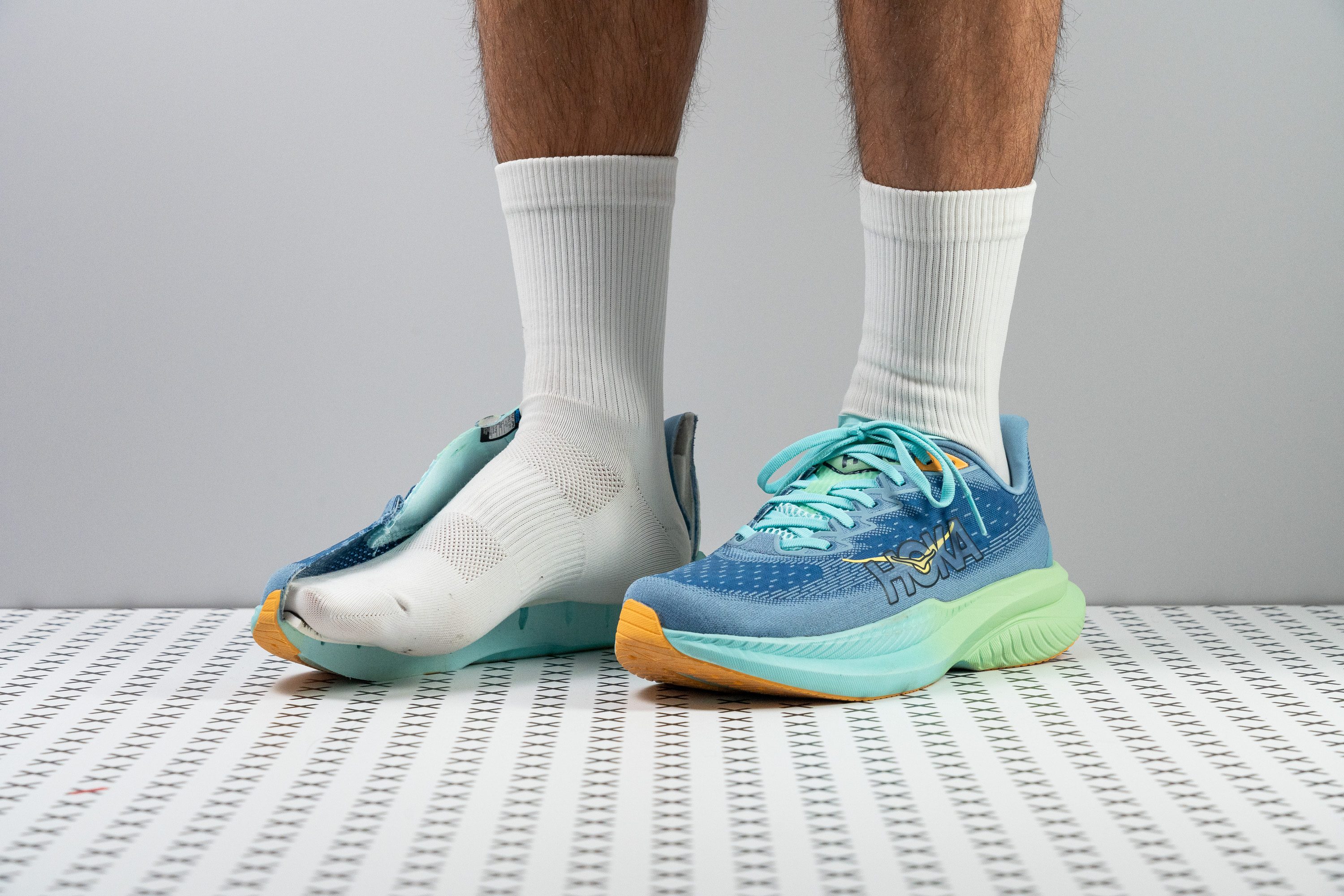Our verdict
- Our top pick in best Hoka running shoes
- Our top pick in best treadmill running shoes
Pros
- Really lightweight
- Fantastic outsole
- Exciting ride
- Highly cushioned
- Great for heel strikers
- Handles faster paces
- Superb lockdown
- Excellent value at $140
Cons
- Drop varies from stated
- Somewhat narrow fit
- Thin tongue
Audience verdict
- Top 15% in Hoka running shoes
- Top 2% most popular running shoes
Comparison
The most similar running shoes compared
+ + Add a shoe | |||||
|---|---|---|---|---|---|
| Audience score | 88 Great! | 89 Great! | 89 Great! | 94 Superb! | |
| Price | $140 | $160 | $160 | $130 | |
| Pace | Daily running | Daily running | Daily running | Daily running | |
| Arch support | Neutral | Neutral | Neutral | Neutral | |
| Weight lab Weight brand | 8.2 oz / 232g 8.3 oz / 235g | 9.9 oz / 282g 10 oz / 283g | 9.3 oz / 264g 9 oz / 254g | 9.7 oz / 274g 9.5 oz / 270g | |
| Lightweight | ✓ | ✗ | ✗ | ✗ | |
| Drop lab Drop brand | 9.6 mm 5.0 mm | 8.7 mm 5.0 mm | 11.0 mm 10.0 mm | 10.5 mm 5.0 mm | |
| Strike pattern | HeelMid/forefoot | HeelMid/forefoot | Heel | Heel | |
| Midsole softness | Balanced | Soft | Balanced | Soft | |
| Difference in midsole softness in cold | Big | Normal | Small | Normal | |
| Toebox durability | Decent | Decent | Decent | Bad | |
| Heel padding durability | Bad | Good | Decent | Decent | |
| Outsole durability | Good | Good | Good | Good | |
| Breathability | Breathable | Breathable | Moderate | Breathable | |
| Toebox width at the widest part | Medium | Medium | Medium | Medium | |
| Toebox width at the big toe | Narrow | Medium | Medium | Medium | |
| Stiffness | Flexible | Moderate | Moderate | Flexible | |
| Difference in stiffness in cold | Small | Normal | Normal | Normal | |
| Torsional rigidity | Stiff | Stiff | Stiff | Stiff | |
| Heel counter stiffness | Stiff | Stiff | Moderate | Stiff | |
| Rocker | ✓ | ✗ | ✓ | ✗ | |
| Heel lab Heel brand | 36.0 mm 37.0 mm | 39.3 mm 39.0 mm | 35.2 mm 37.0 mm | 40.7 mm 40.0 mm | |
| Forefoot lab Forefoot brand | 26.4 mm 32.0 mm | 30.6 mm 34.0 mm | 24.2 mm 27.0 mm | 30.2 mm 35.0 mm | |
| Widths available | NormalWide | NormalWide | Normal | Normal | |
| Orthotic friendly | ✓ | ✓ | ✓ | ✓ | |
| Season | SummerAll seasons | SummerAll seasons | All seasons | SummerAll seasons | |
| Removable insole | ✓ | ✓ | ✓ | ✓ | |
| Ranking | #116 Top 45% | #74 Top 29% | #83 Top 32% | #3 Top 2% | |
| Popularity | #5 Top 2% | #22 Top 9% | #203 Bottom 21% | #185 Bottom 28% |
Who should buy
We think the Hoka Mach 6 is an excellent choice for:
- Enthusiasts of the Mach looking for the best version yet, with an upgraded upper, enhanced grip, and more cushioning than ever before.
- Runners seeking a lightweight daily trainer designed for narrow feet.
- Those who want a versatile daily workhorse that excels at long runs, easy days, and even speed training or fartlek sessions.
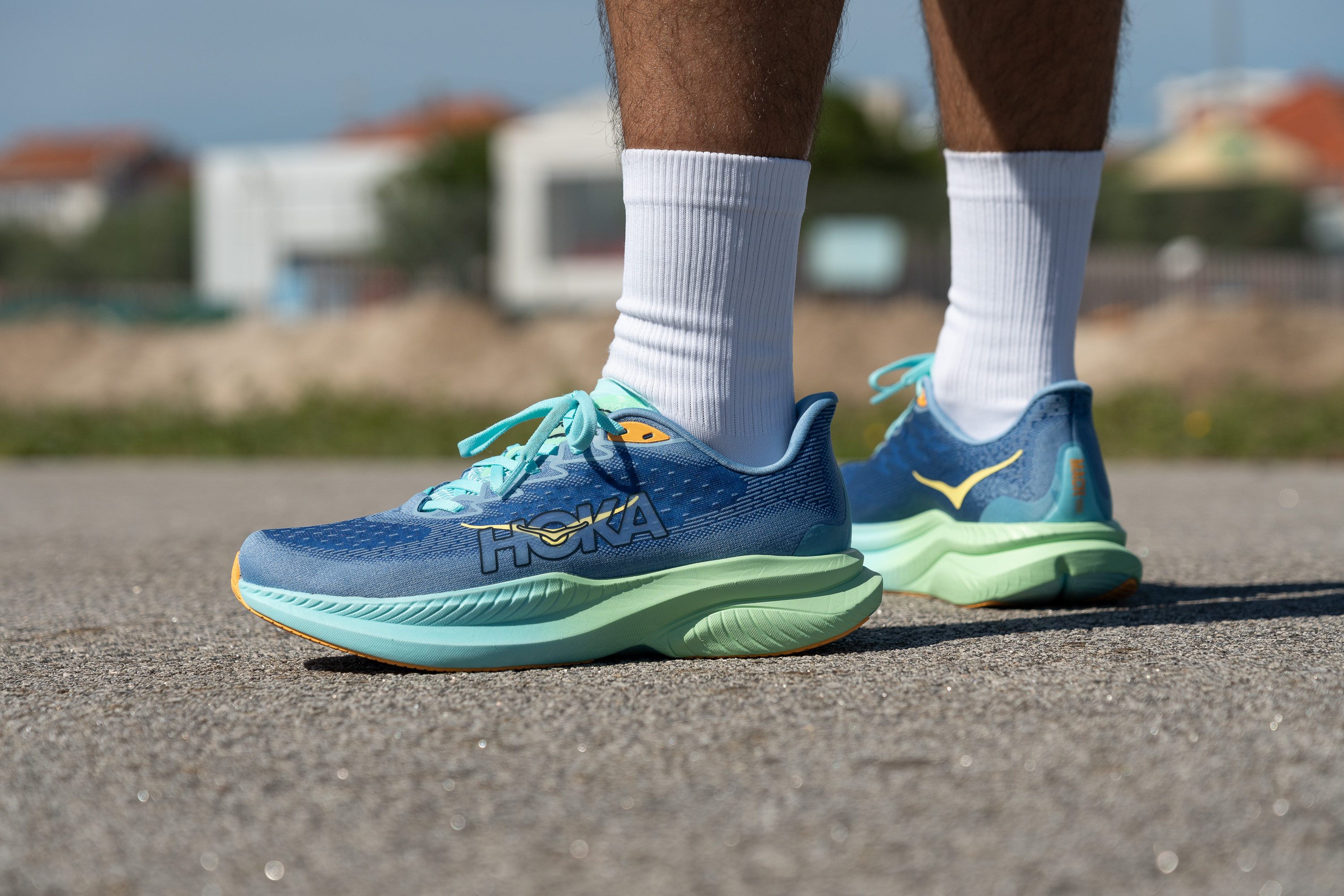
Who should NOT buy
We think the Hoka Mach 6, while bouncier than ever, still falls short compared to shoes with premium, PEBA-based midsoles. If you're after maximum energy return for training, we believe there are better choices—like the ASICS Superblast, which offers superb energy return without a plate, or the Hoka Mach X, a beefed-up, plated version of the Mach 6.
Additionally, we do not recommend the Mach 6 for runners with wide feet, as it tends to be narrow. Instead, the New Balance Rebel v4 provides a more accommodating upper at a similar price, making it a more suitable option for those seeking a lightweight build.
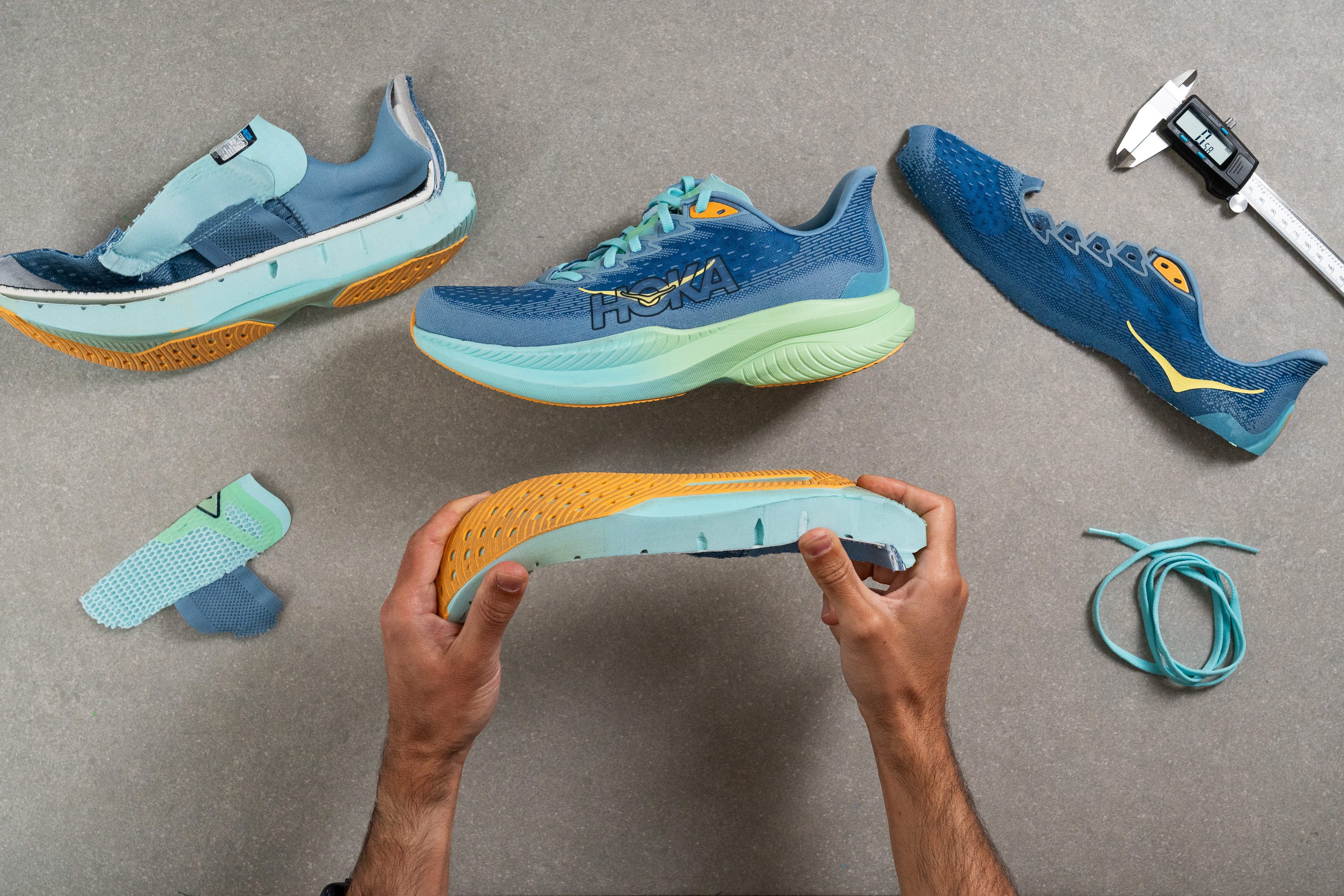
Breathability
We believe that Hoka's decision to choose knit over a typical upper is a bold move, especially since achieving optimal breathability can be challenging. Nevertheless, the Mach 6 excels in ventilation—so much so that we awarded it a perfect score of 5/5 in our smoke test.
At first glance, may not be apparent how the Mach 6 is doing it. However, a simple experiment—shining a light over the shoe sliced in half—uncovers the truth.
The toebox features large ventilation holes, with progressively smaller ones extending through the midfoot. Additionally, we discovered that the tongue is exceptionally well-ventilated.
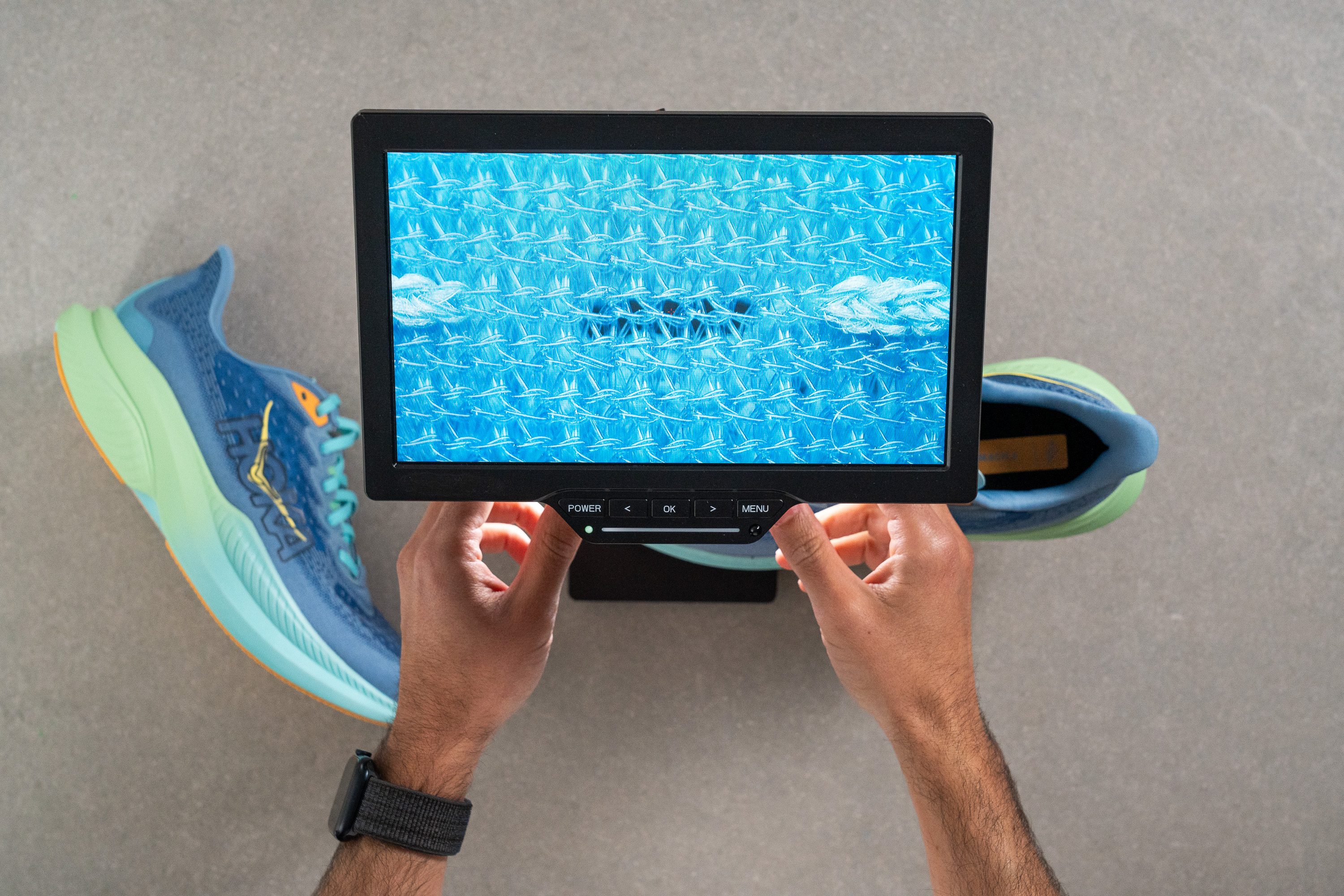
This intriguing upper captured our interest, prompting us to examine it under a microscope.
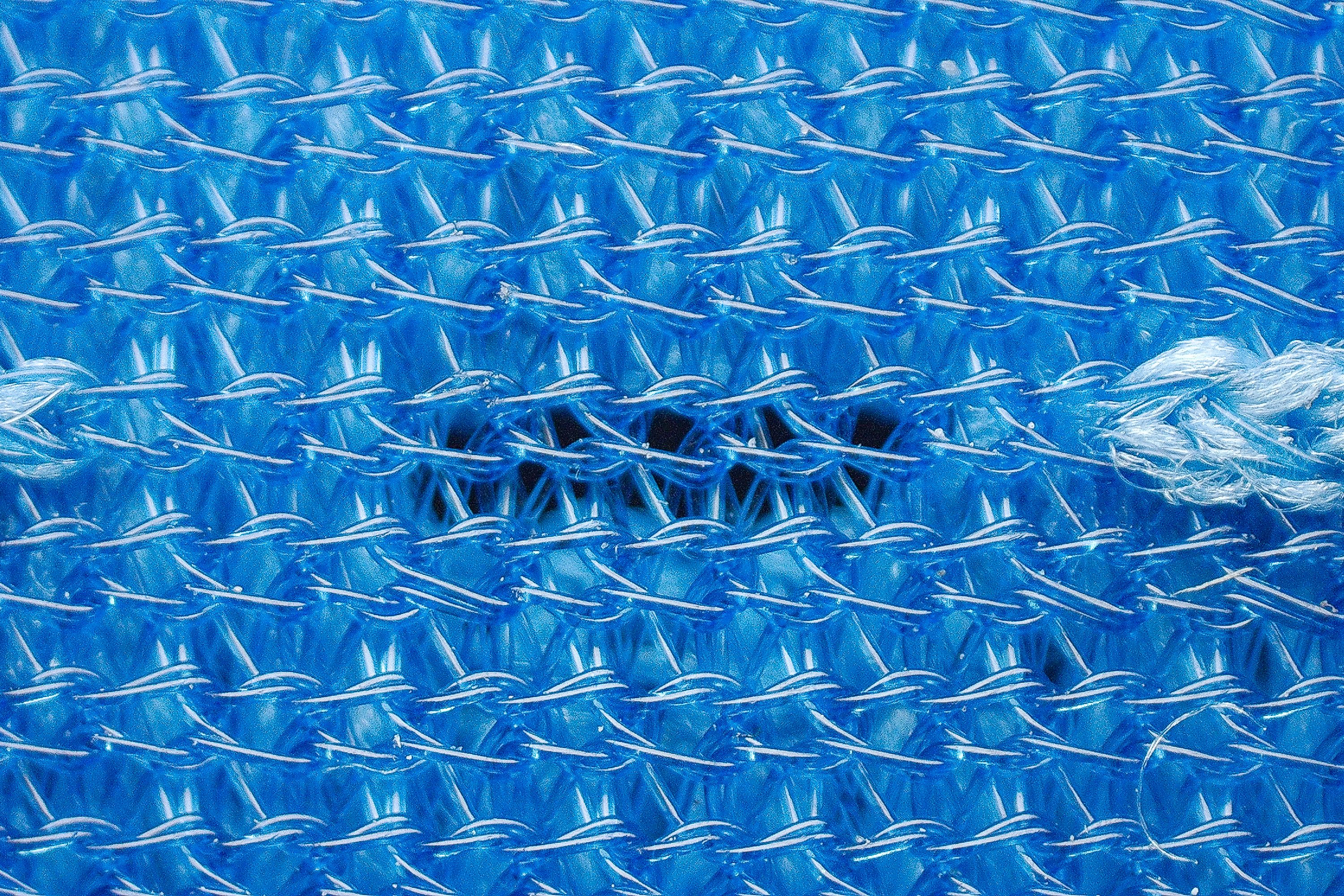
Indeed, Hoka has adopted a hybrid approach, overlaying a thin mesh atop the Creel Jacquard Knit, and the ventilation holes are clearly visible underneath the first layer.
We then manually examined the upper, feeling for any rough areas and evaluating the padding. Our assessment is that the padding is quite adequate for a lightweight road daily trainer, earning our seal of approval.
| Mach 6 | 5 |
| Average | 3.8 |
Durability
Toebox durability
We've already established that the upper boasts excellent ventilation, but high breathability often comes with a trade-off in durability. Is this the case here?
It appears so, although it's not a major concern for us. Despite scoring only 2/5 in our initial Dremel test, we are convinced that most runners will not encounter any problems with the Mach 6, except perhaps those adventurous enough to tackle some trails—which we don't recommend at all.
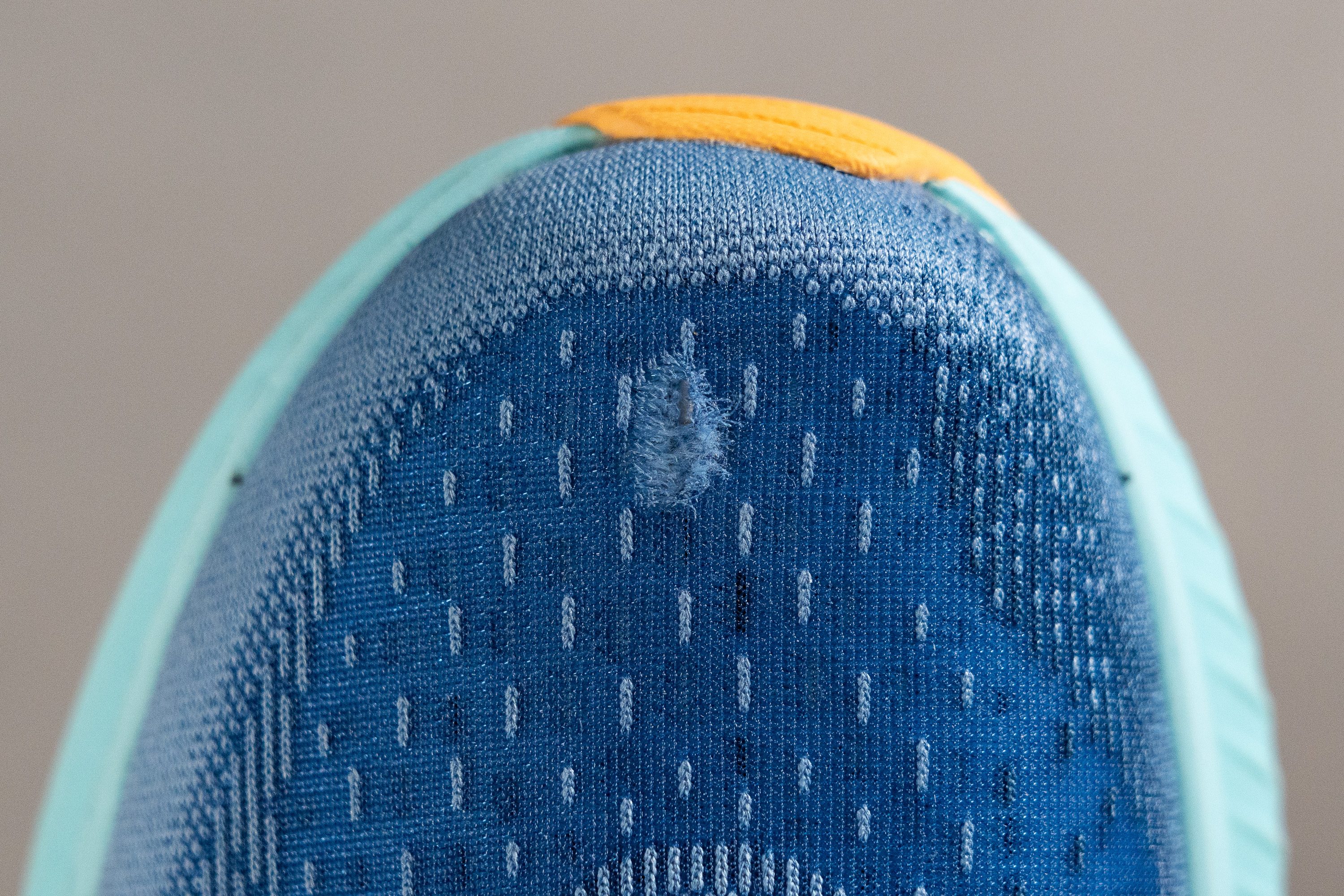
| Mach 6 | 2 |
| Average | 2.5 |
Heel padding durability
Following our second consecutive Dremel test, the area was completely destroyed (1/5)—a significant concern regarding durability for those prone to wearing holes in this region.
However, if you do not typically have this issue in other running shoes, it's unlikely you'll experience severe wear like this one, but we think that some minor damage could still occur once the shoe accumulates substantial mileage.
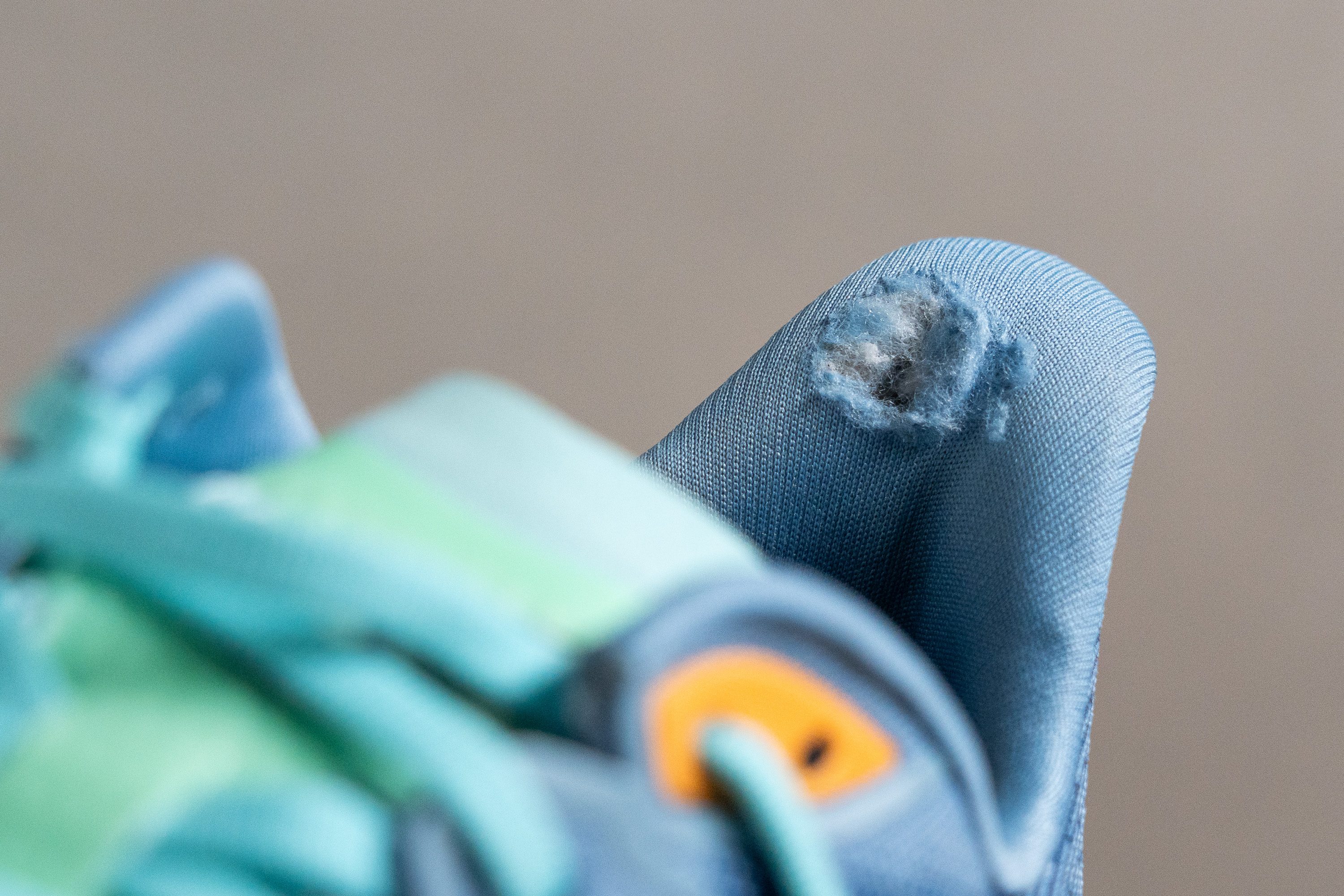
| Mach 6 | 1 |
| Average | 3.3 |
Outsole hardness
Shifting our focus to the outsole, we discovered that Hoka played it safe by opting for their usual Durabrasion rubber.
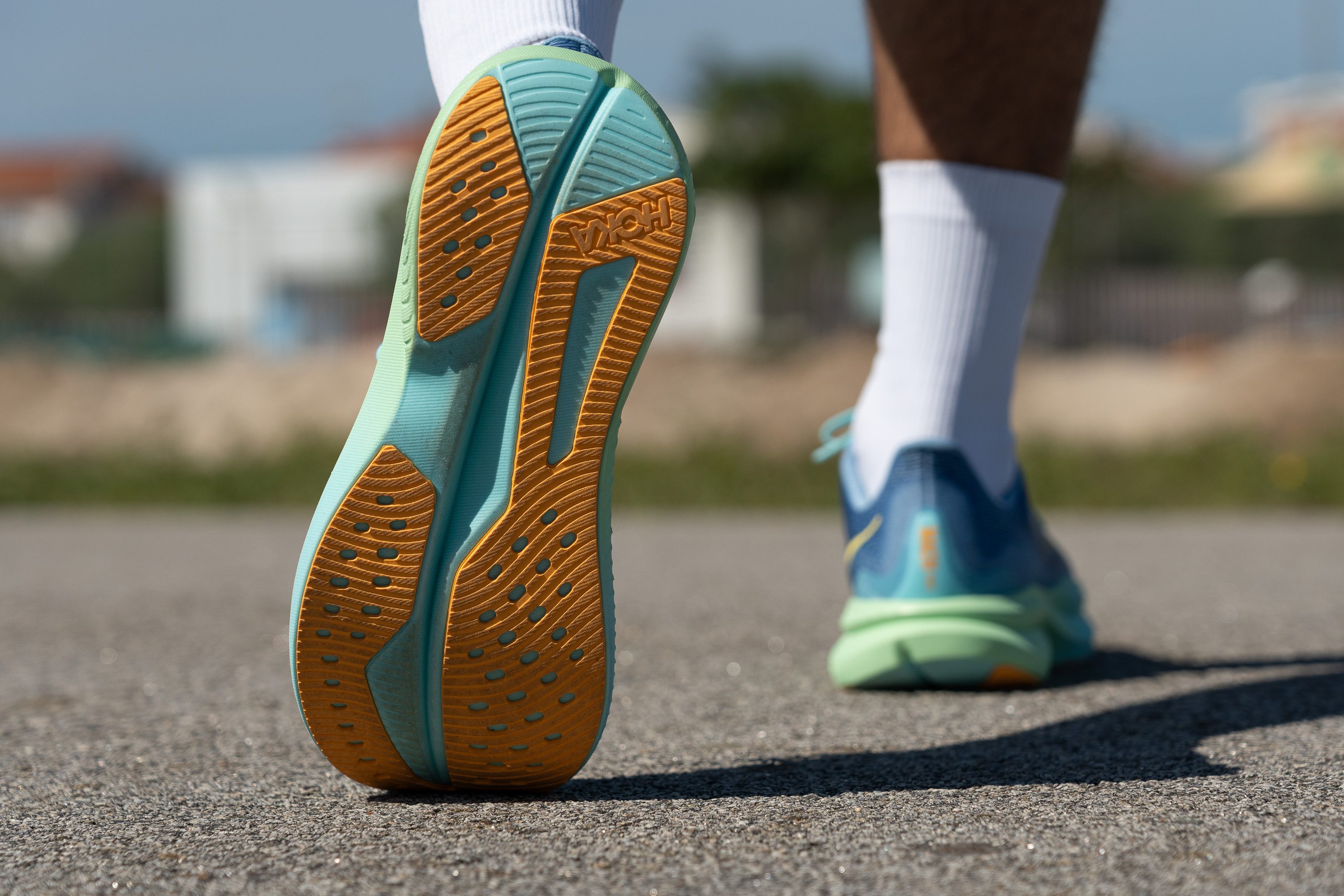
During our durometer test, the tool registered a 75.1-HC reading, revealing a rubber slightly softer than average. This resulted in exceptional grip during our runs, comparable to the top-performing shoes on the market, including those at much higher price points.
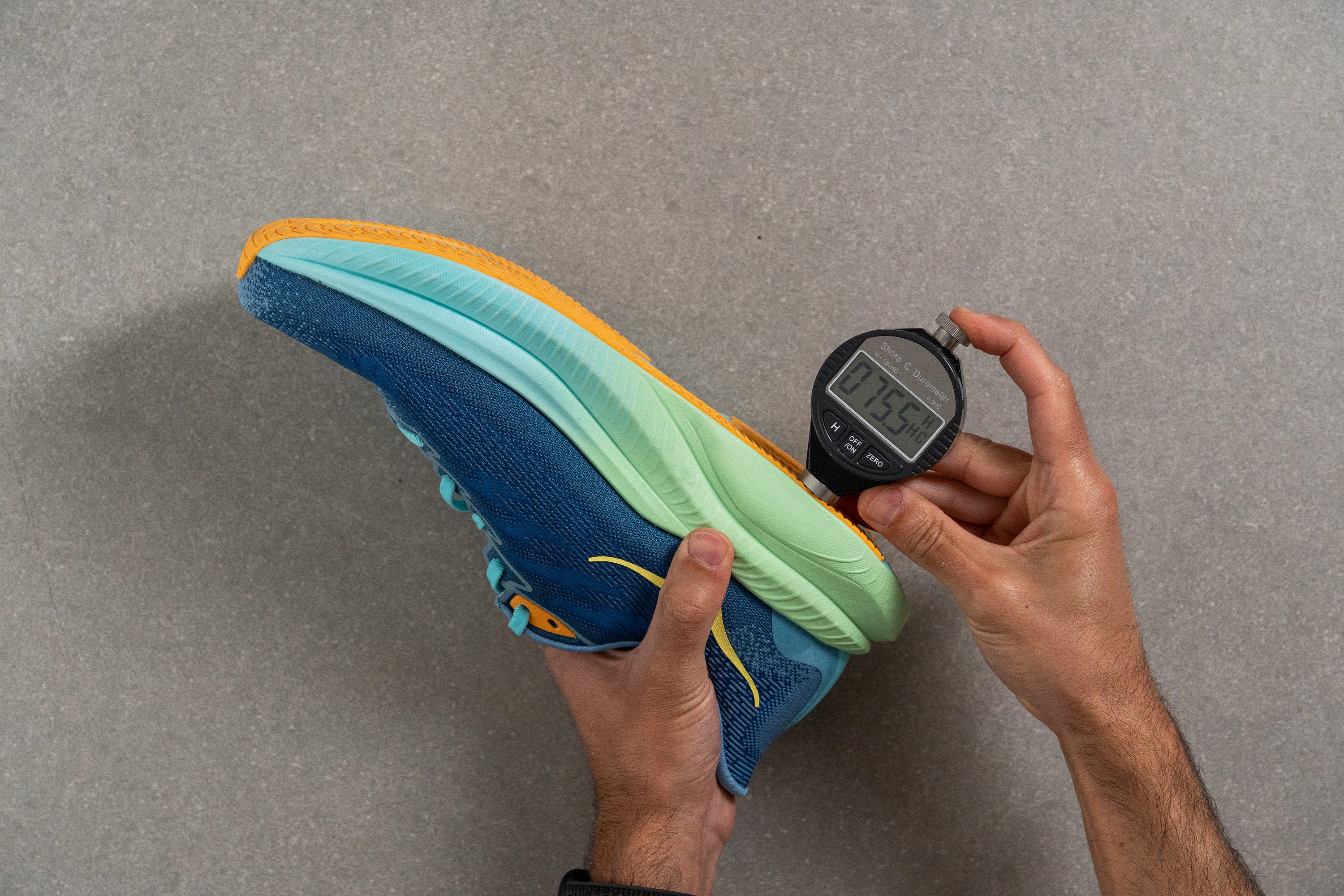
| Mach 6 | 75.1 HC |
| Average | 80.1 HC |
Outsole durability
But wait for it—because the rubber delivered a fantastic, better-than-expected performance in our latest Dremel test.
After the tool worked hard to wear down the rubber, we found a minimal 0.6mm dent. This is an excellent result that promises a long shelf life for the shoe.
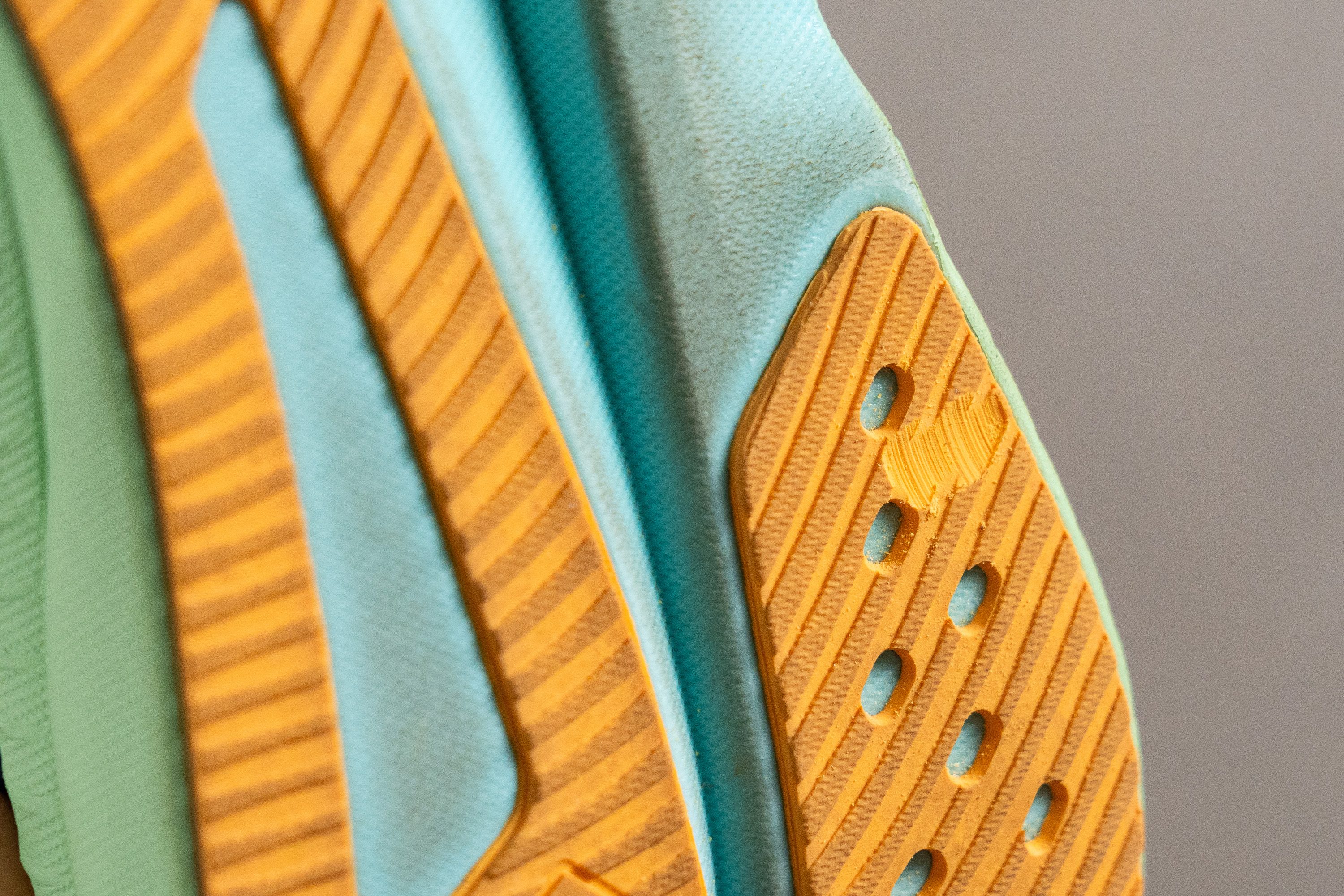
| Mach 6 | 0.6 mm |
| Average | 0.9 mm |
Outsole thickness
Certainly, Hoka had already tested the outsole to the limit well before our lab review, discovering that 2.5mm of rubber was sufficient—less than what is found on most daily trainers.
What are the advantages of this approach? It yields greater responsiveness, a more dynamic ride, and a lighter weight. We're definitely on board!
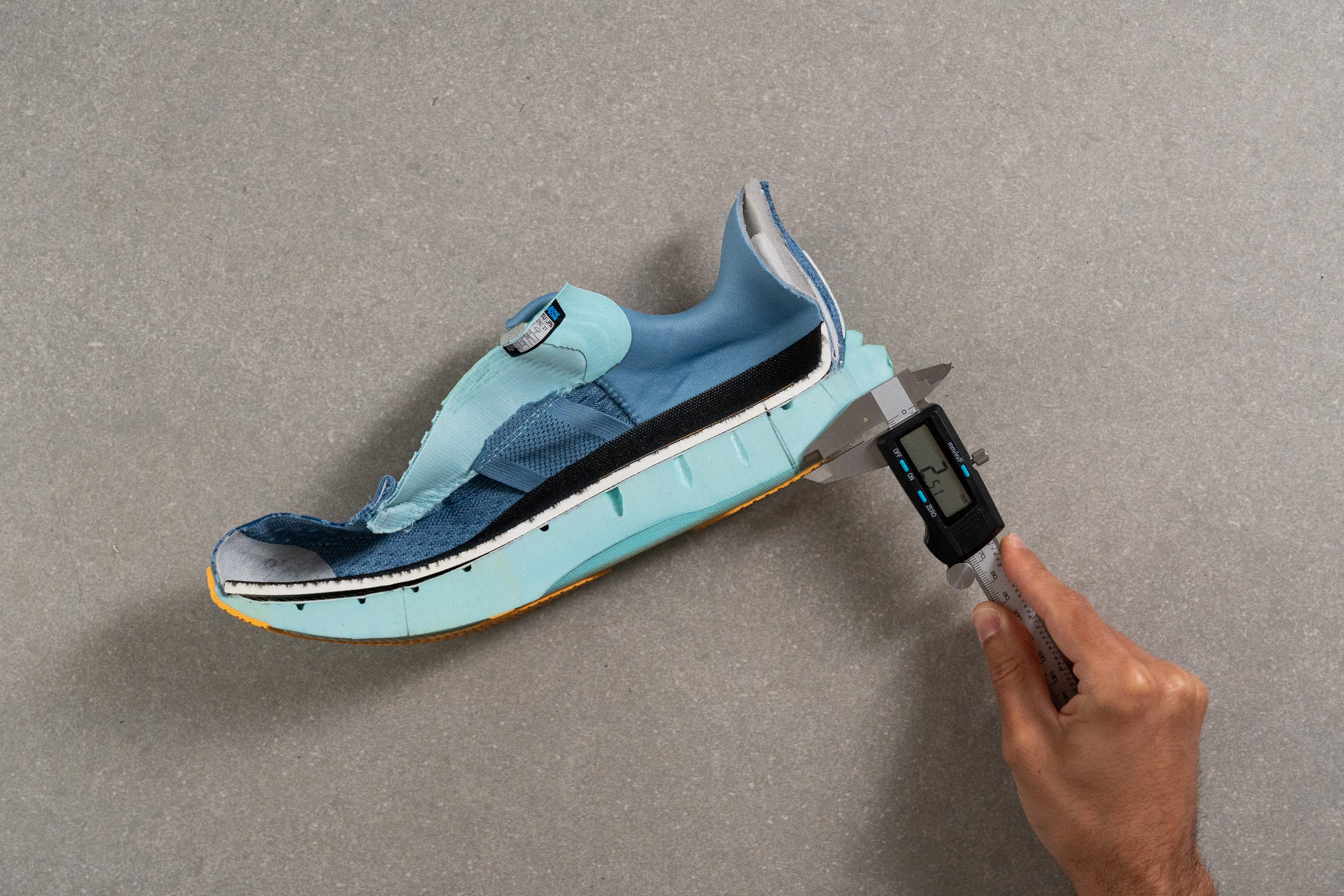
| Mach 6 | 2.5 mm |
| Average | 3.2 mm |
Weight
During all of our test runs, we found the Mach 6 impressively light for its stack height, and we confirmed this on our scale back in the lab.
Weighing in at just 8.2 oz or 232g, it's an outstanding choice for those seeking a featherweight yet cushioned workhorse.
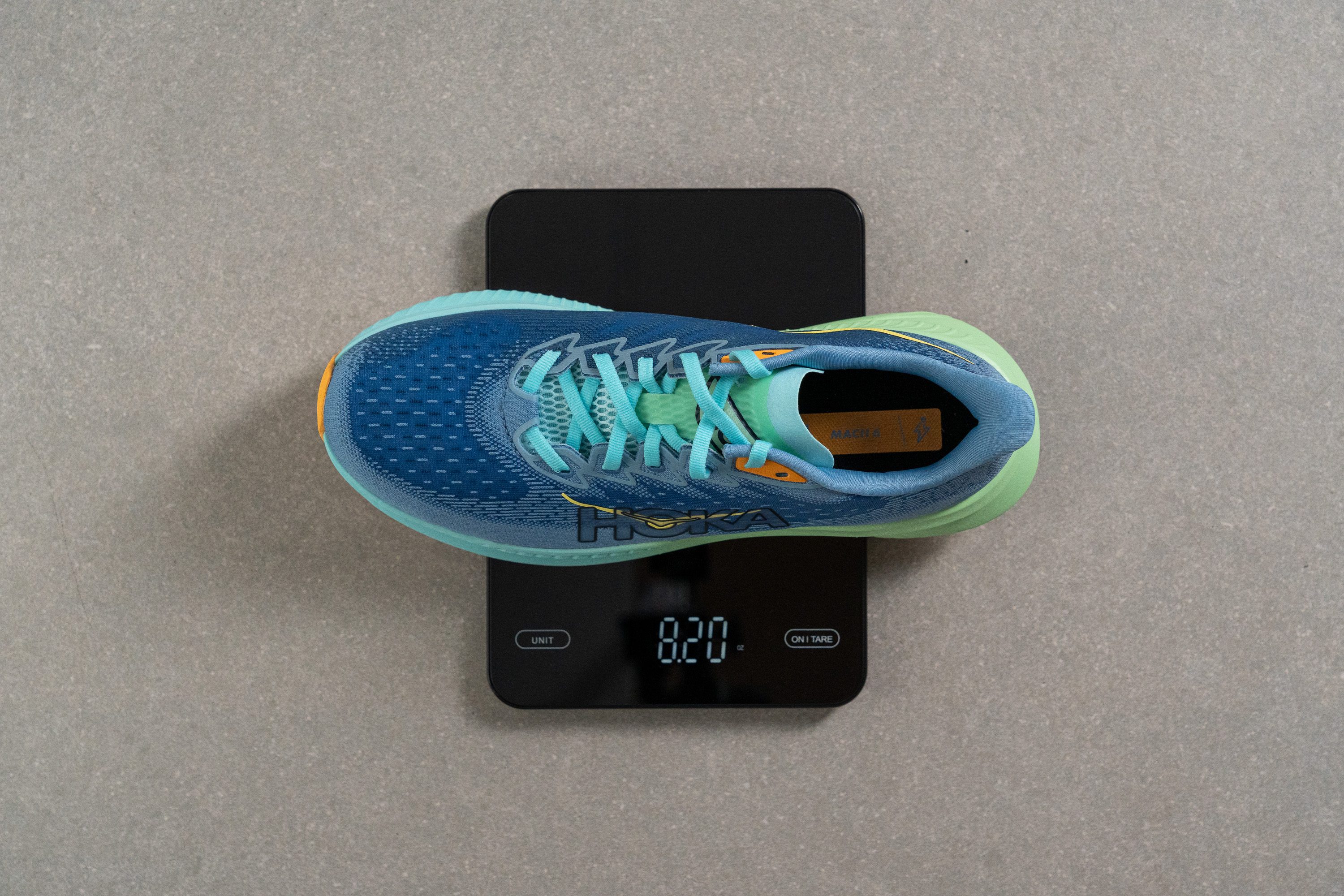
| Mach 6 | 8.18 oz (232g) |
| Average | 9.35 oz (265g) |
Cushioning
Hoka decided against including reflective elements in the Mach 6, which is disappointing. However, we think that the absence of hi-vis stuff can be overlooked this time, considering the reasonable price point.
Heel stack
The heel of the Mach 6 is exceptionally cushioned—we measured it at 36.0 mm!
Based on this measurement, we can confidently state that the Mach 6 is not just suitable for any heel striker but also stands out from the club of average-stacked shoes.
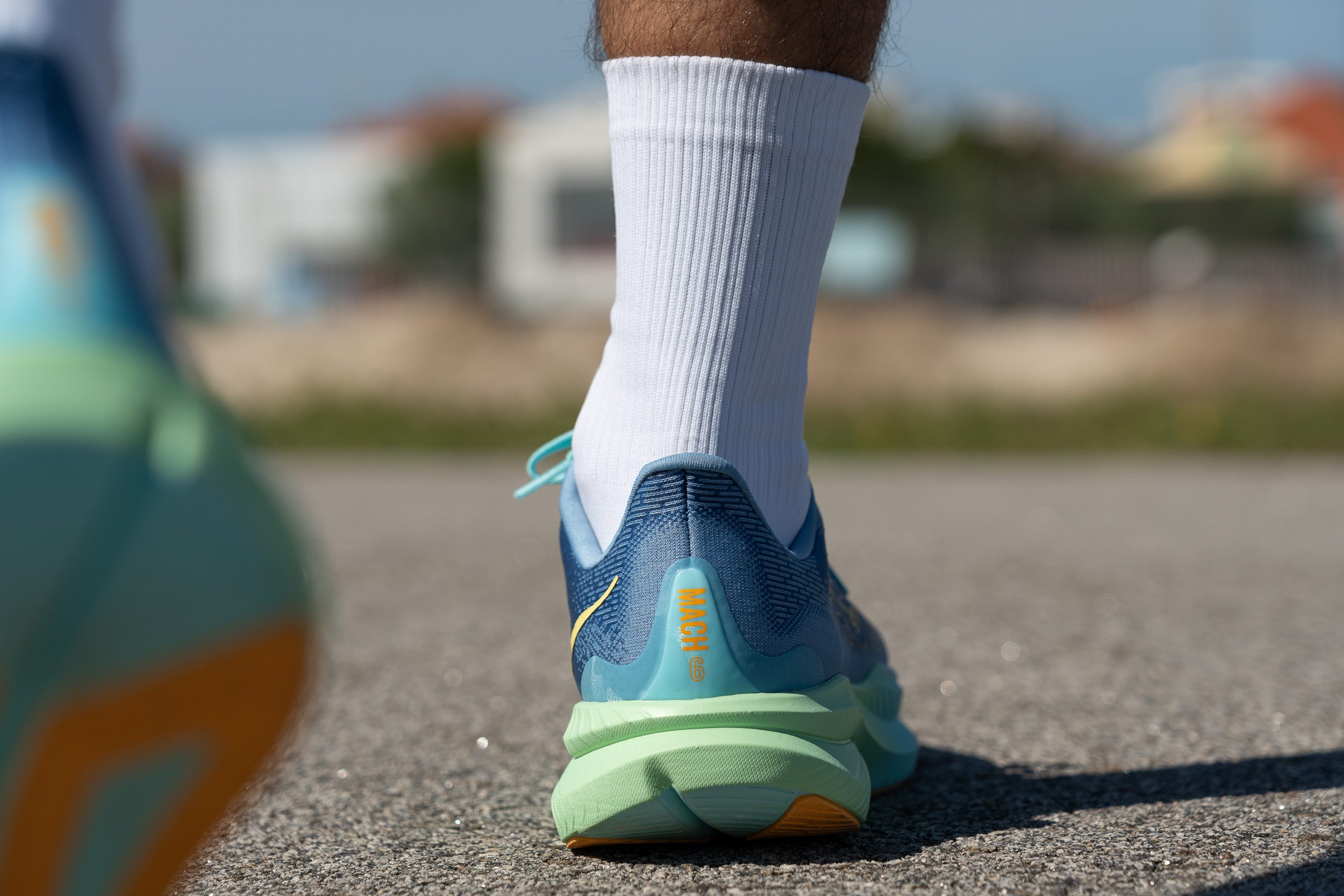
With over 35mm in the heel, the shoe offers a different Mach feel and clearly aligns with trends from other brands that favour increasingly higher stacks.
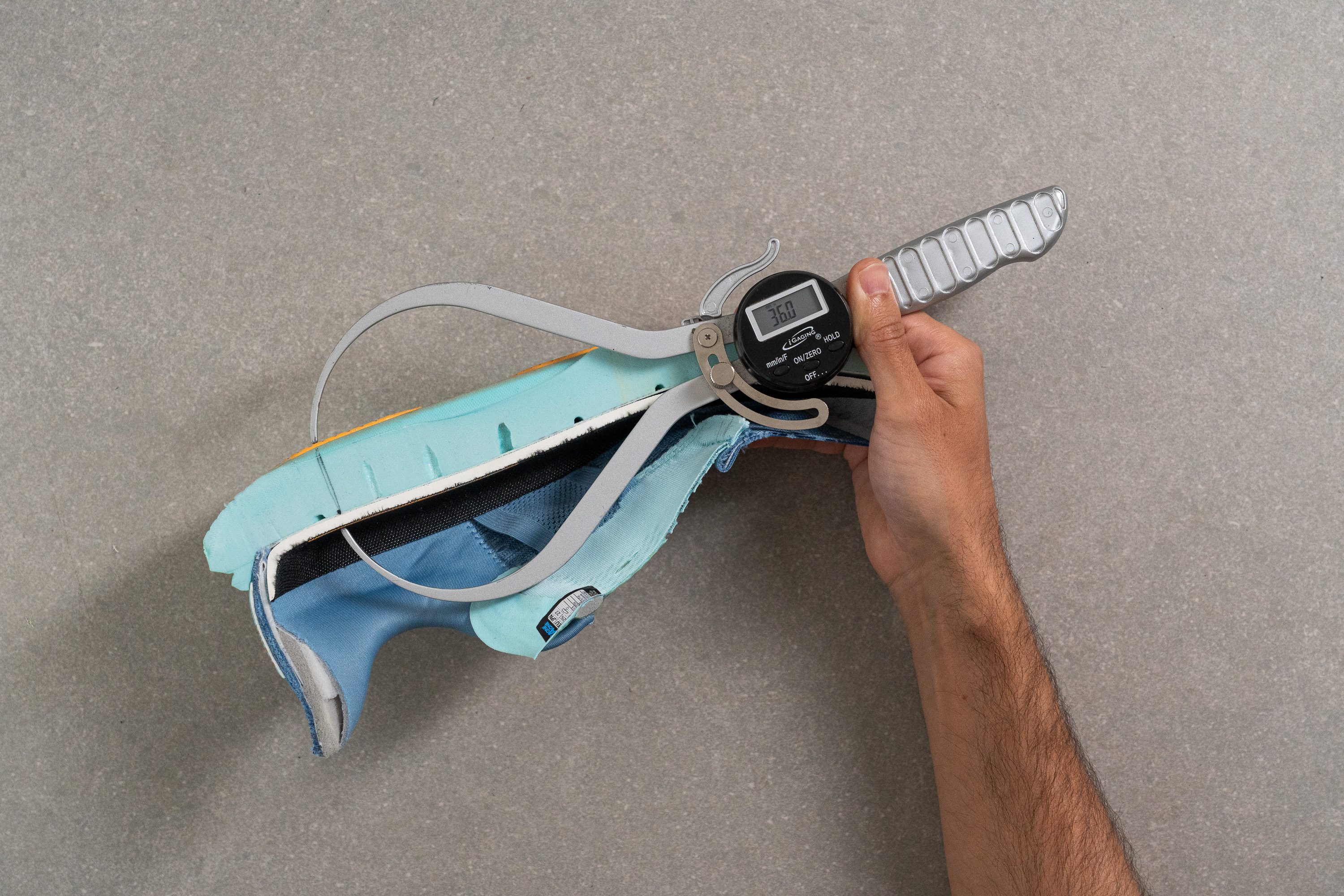
| Mach 6 | 36.0 mm |
| Average | 33.9 mm |
Forefoot stack
In the forefoot, we measured 26.4 mm—still cushioned, though not as surprising as before.
However, this might be welcomed by those who prefer a more natural, grounded running experience.
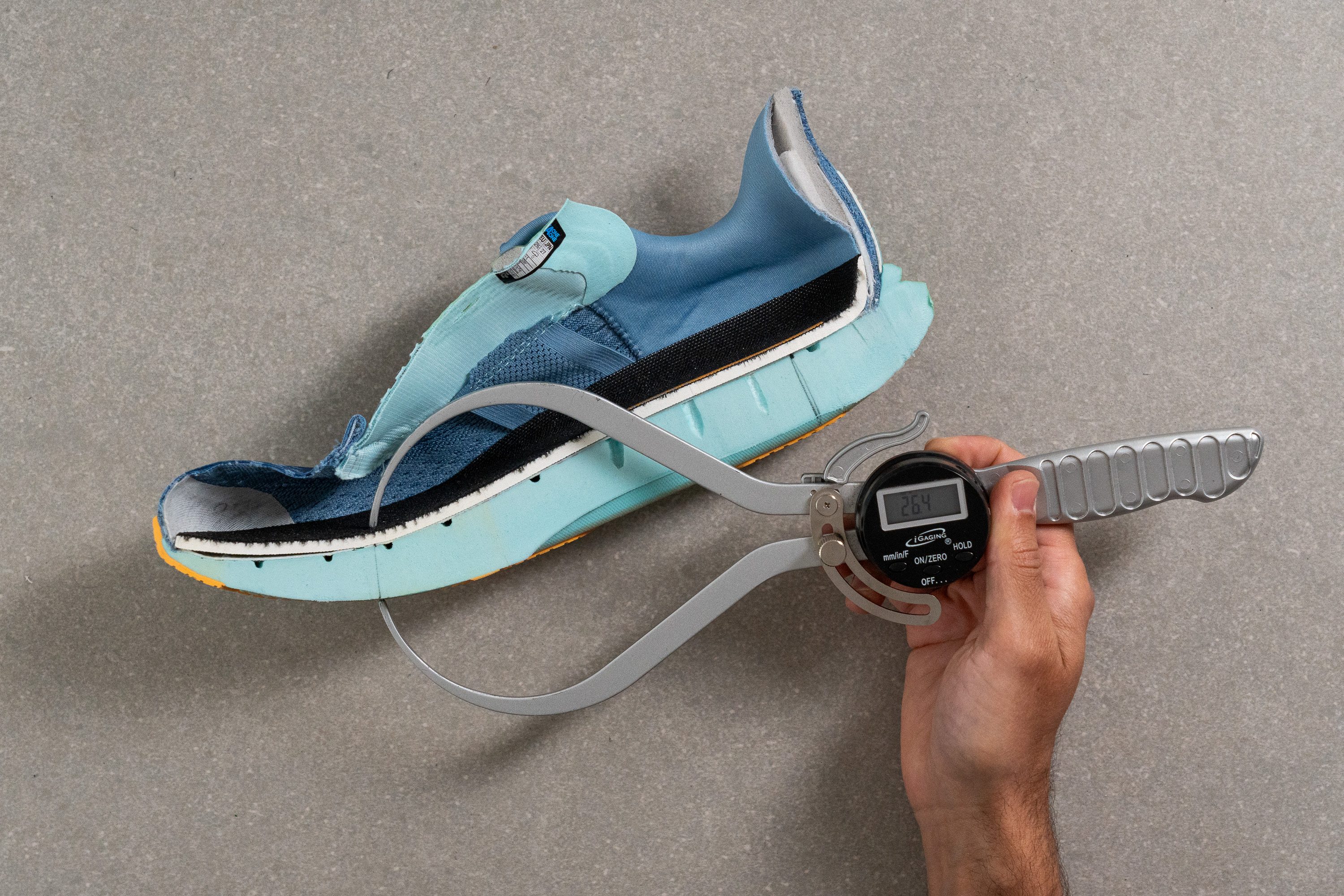
| Mach 6 | 26.4 mm |
| Average | 25.3 mm |
Drop
These two previous measurements result in a 9.6-mm heel-to-toe drop, a significant departure from the 5-mm drop claimed by Hoka.
Why does this discrepancy occur? We can assure you that we measure shoes according to the official World Athletics standards, but unfortunately, it appears some brands may use different measurement points.
However, the Mach 6 does not feel drastically different from a 5-mm drop, at least from our perspective. The geometry of the shoe gives it the feel more akin to an 8-mm drop rather than a 5 or 10 mm. Essentially, it behaves much like most daily trainers.
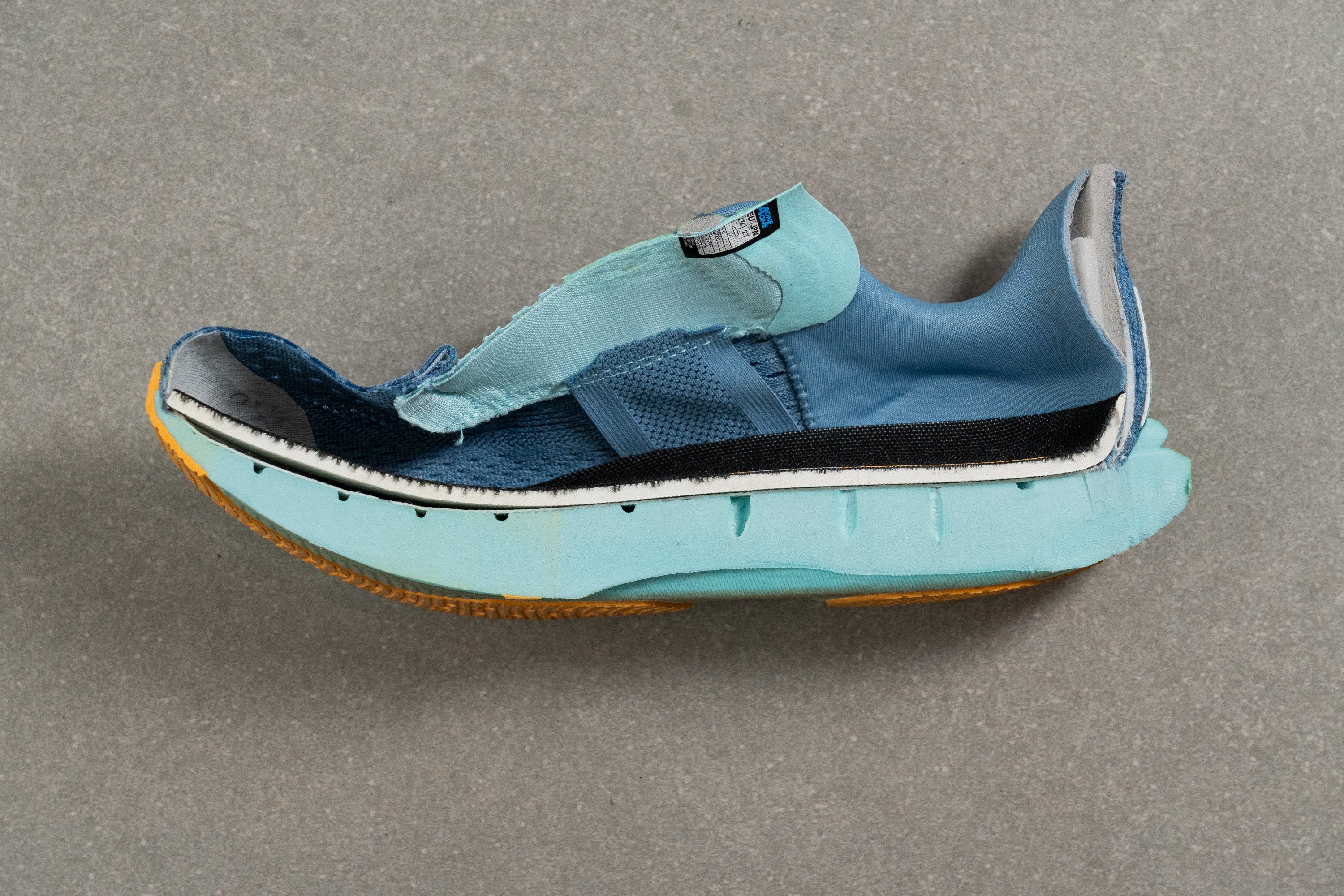
| Mach 6 | 9.6 mm |
| Average | 8.6 mm |
Insole thickness
The insole is really standard 4.5 mm thick, and there's nothing particularly noteworthy about it, which is actually a good thing!
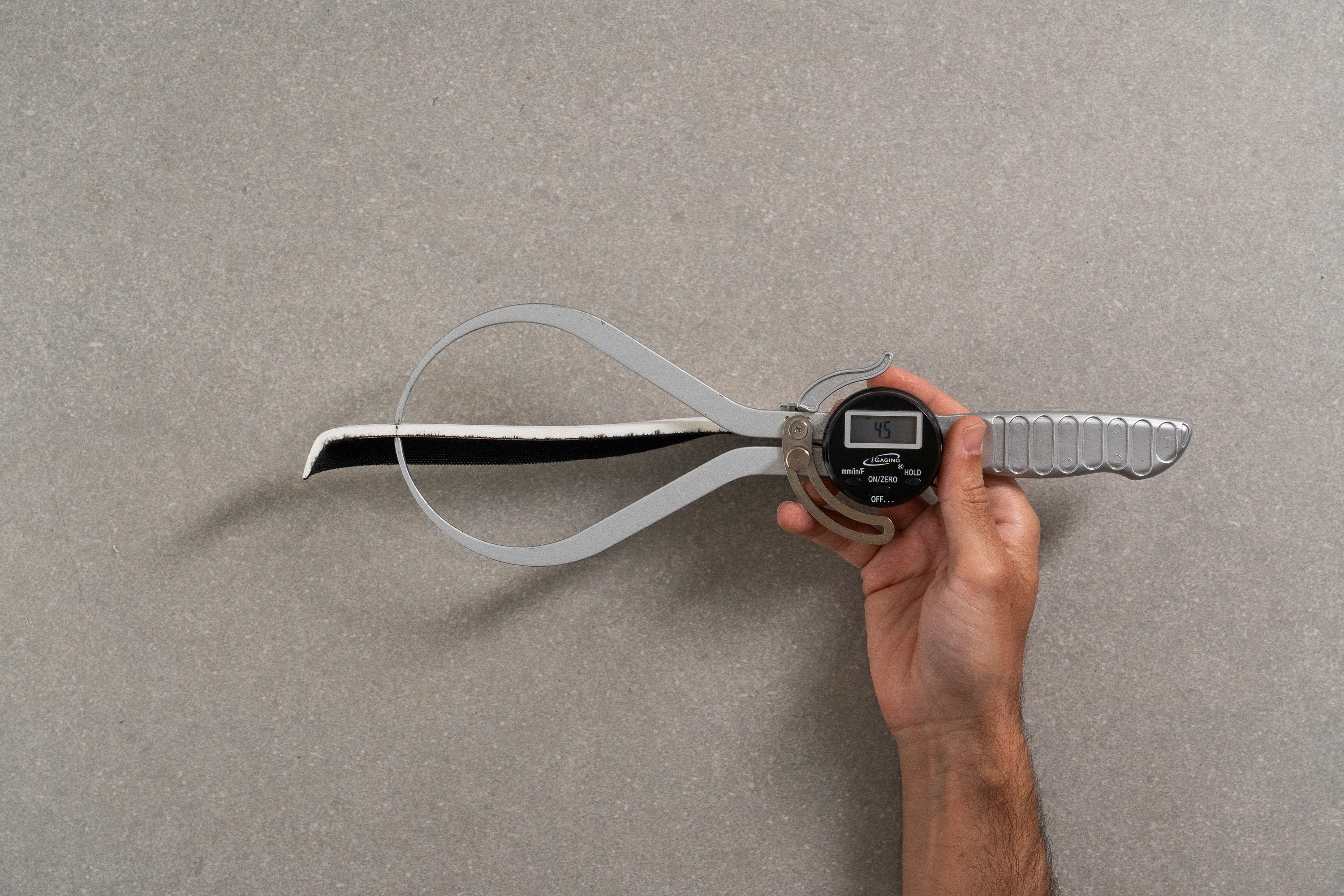
| Mach 6 | 4.5 mm |
| Average | 4.4 mm |
Midsole softness
Moving to the midsole, we encountered a mix of impressions. While the midsole wasn’t plush, it was well-balanced in terms of softness (we liked it!), registering at 20.4 HA.
It proved to be enjoyable and fun, definitely surpassing the performance of an average budget-friendly shoe. However, it still falls a bit short in terms of energy return.
This is due to Hoka's choice to stick with EVA technology in the Mach 6. Although this isn’t just your cheap EVA but a supercritical formulation that feels quite good and better than ever in the series—it’s still EVA. And regardless of enhancements, EVA can only achieve so much performance.
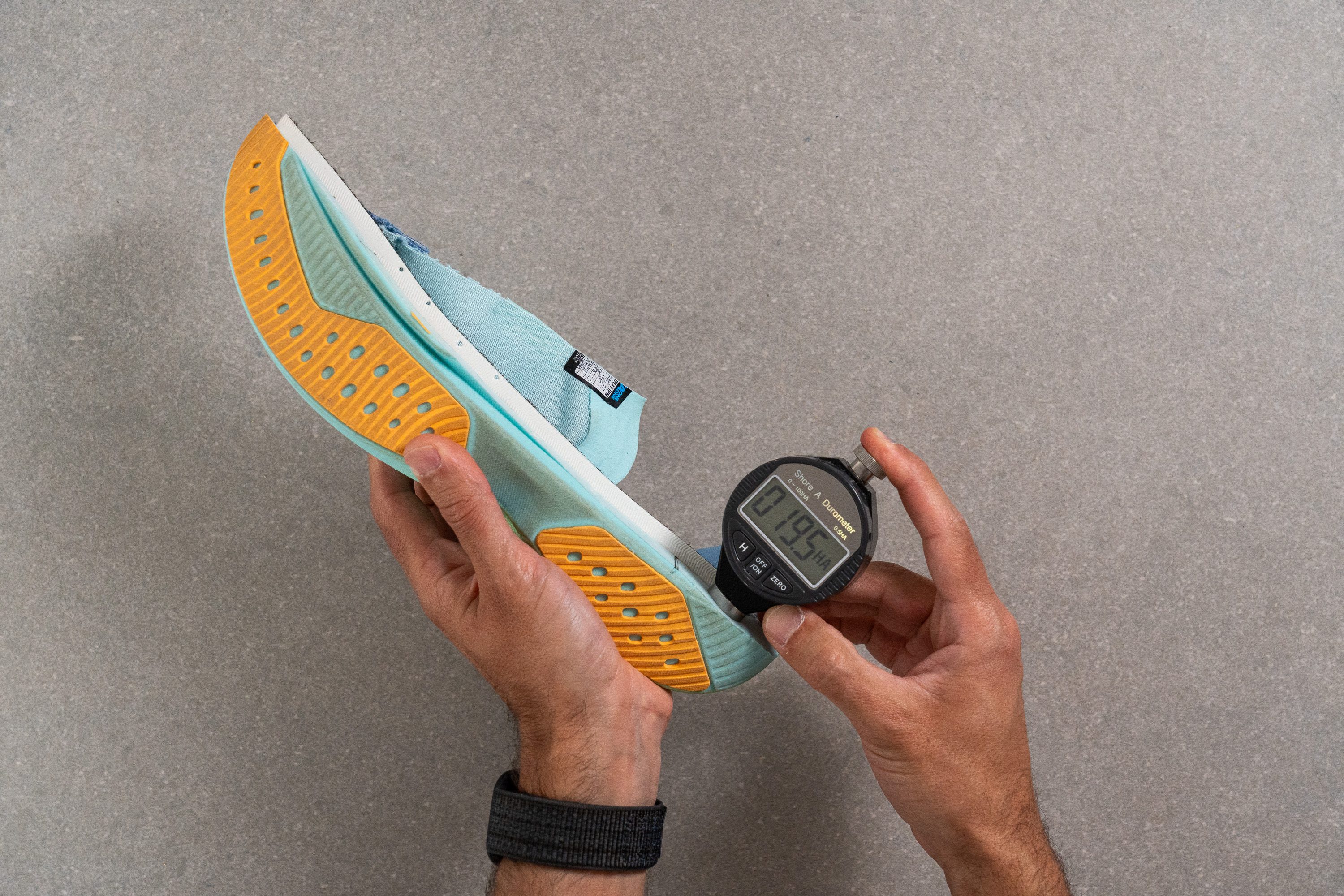
| Mach 6 | 20.4 HA |
| Average | 21.0 HA |
Difference in midsole softness in cold
A notable drawback of EVA-based foams is their diminished performance in colder climates. Indeed, in our tests, the Mach 6 became 42.3% firmer after a brief 20-minute stint in our freezer.
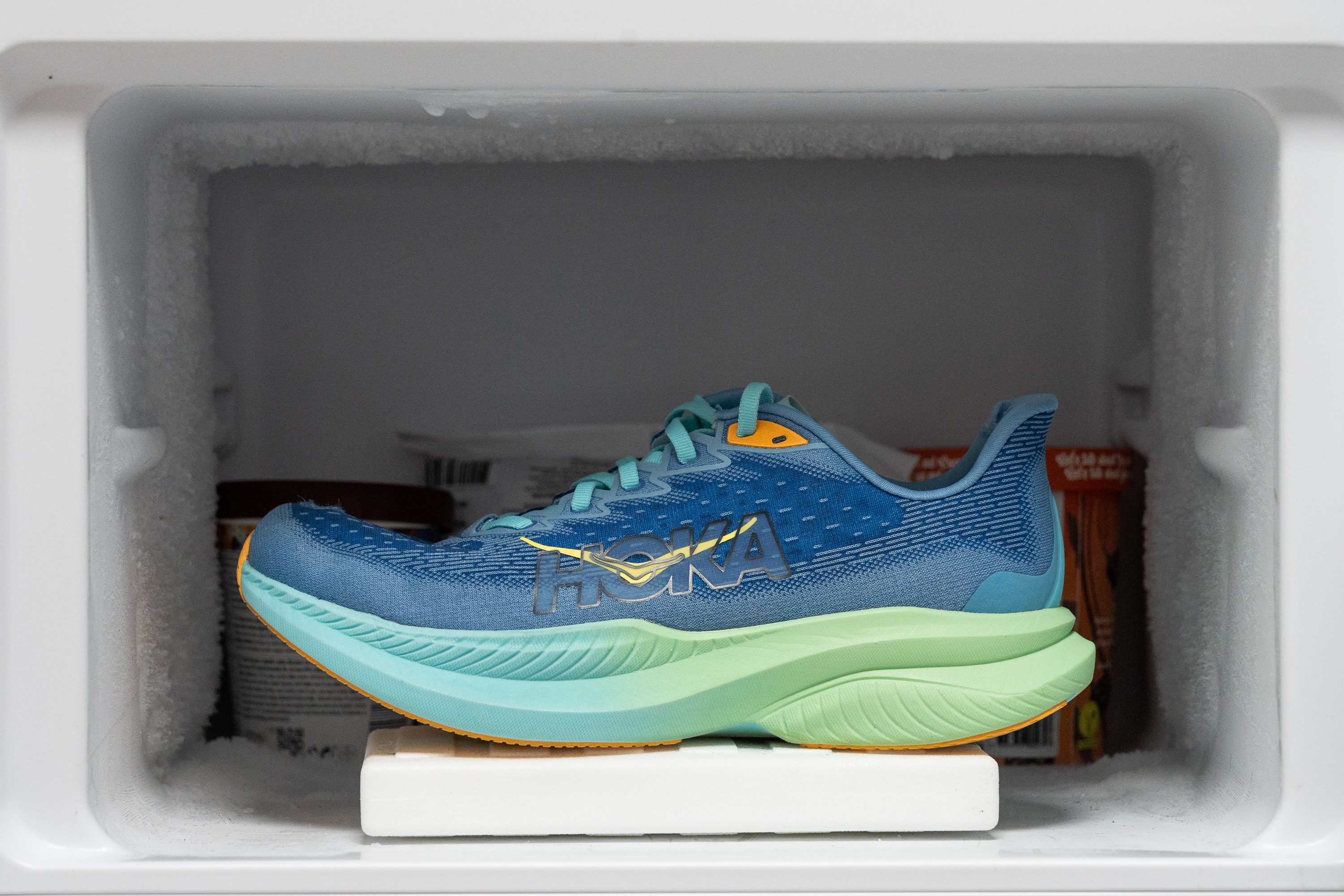
| Mach 6 | 42.3% |
| Average | 25.2% |
Rocker
In our testing, we noted that Hoka's Early-Stage Meta Rocker slightly moved us away from a natural ride, yet it undeniably aids with forward momentum.
Regardless, the rocker feature isn't overly pronounced, so the effect isn’t dramatically felt. It's just the amount needed because of the 36-mm stack height.
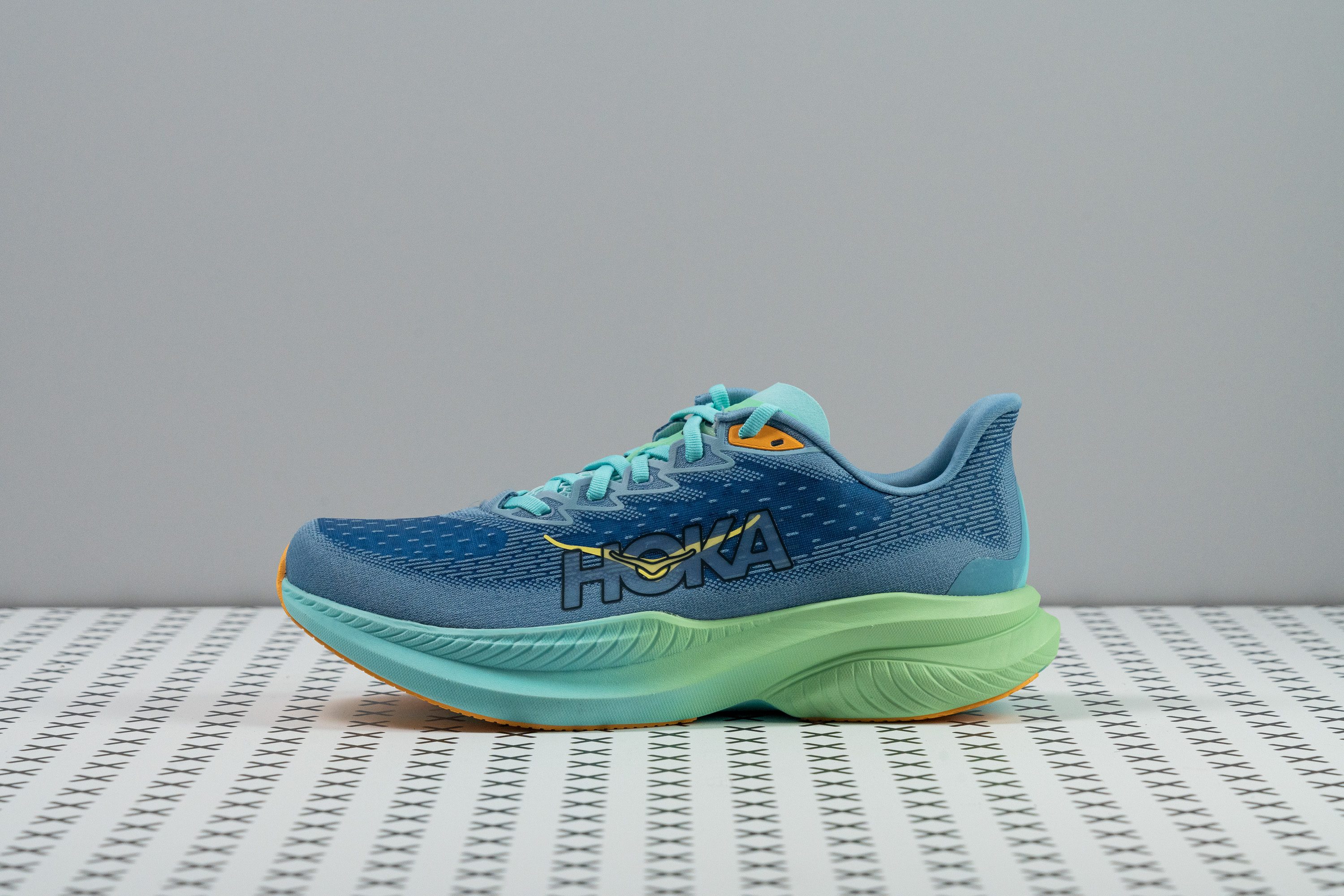
Stability
Lateral stability test
Regarding stability, we initially harboured some reservations, given the Mach 6's narrow build and increased stack height. Yet, we're pleased to report that Hoka has dealt a winning hand in this area.
It's a neutral daily trainer, but its stability impressively exceeds that of the average running shoe.
Torsional rigidity
The stable sensation we experienced with the Mach 6 is largely due to an unexpected finding. In our torsional rigidity test—where we twist and bend the shoe—we awarded it a solid 4/5. That's quite remarkable for a daily trainer without a plate.
Enthusiasts of an old-school, natural ride might be disappointed, as the rigidity is noticeable underfoot with each step.
| Mach 6 | 4 |
| Average | 3.3 |
Heel counter stiffness
Heel counter stiffness? Definitely—another 4/5, which also took us by surprise. Typically, daily running shoes score around 2/5 or 3/5 in our tests, so this clearly leans towards enhanced stability, though it may sacrifice a bit of comfort.
If you're in need of rearfoot stability, we see this as a positive update—we gave the Mach 5 a 3/5. However, we think that for many runners, it might feel a tad too stiff.
| Mach 6 | 4 |
| Average | 2.8 |
Midsole width in the forefoot
A standout trait of the Mach series is its agility, and thankfully, Hoka has steered clear of bulking up the shoe.
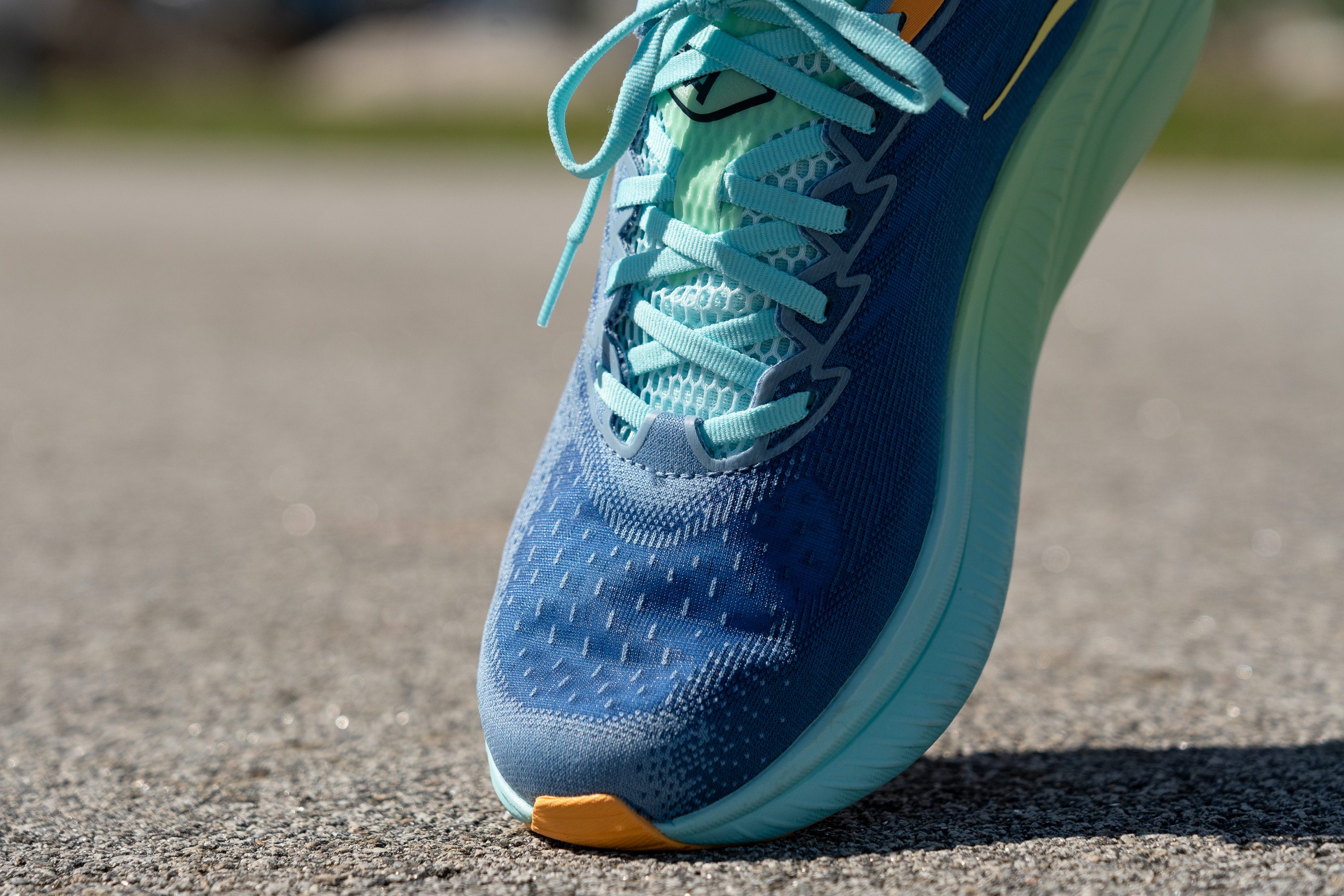
It remains a sleek 113.9mm wide, providing a nimble and far from clunky experience. We appreciate this choice—maintaining a streamlined design without following the trend of overly wide shoes seen in some rivals. This design ensures the Mach retains its quick-footed essence.
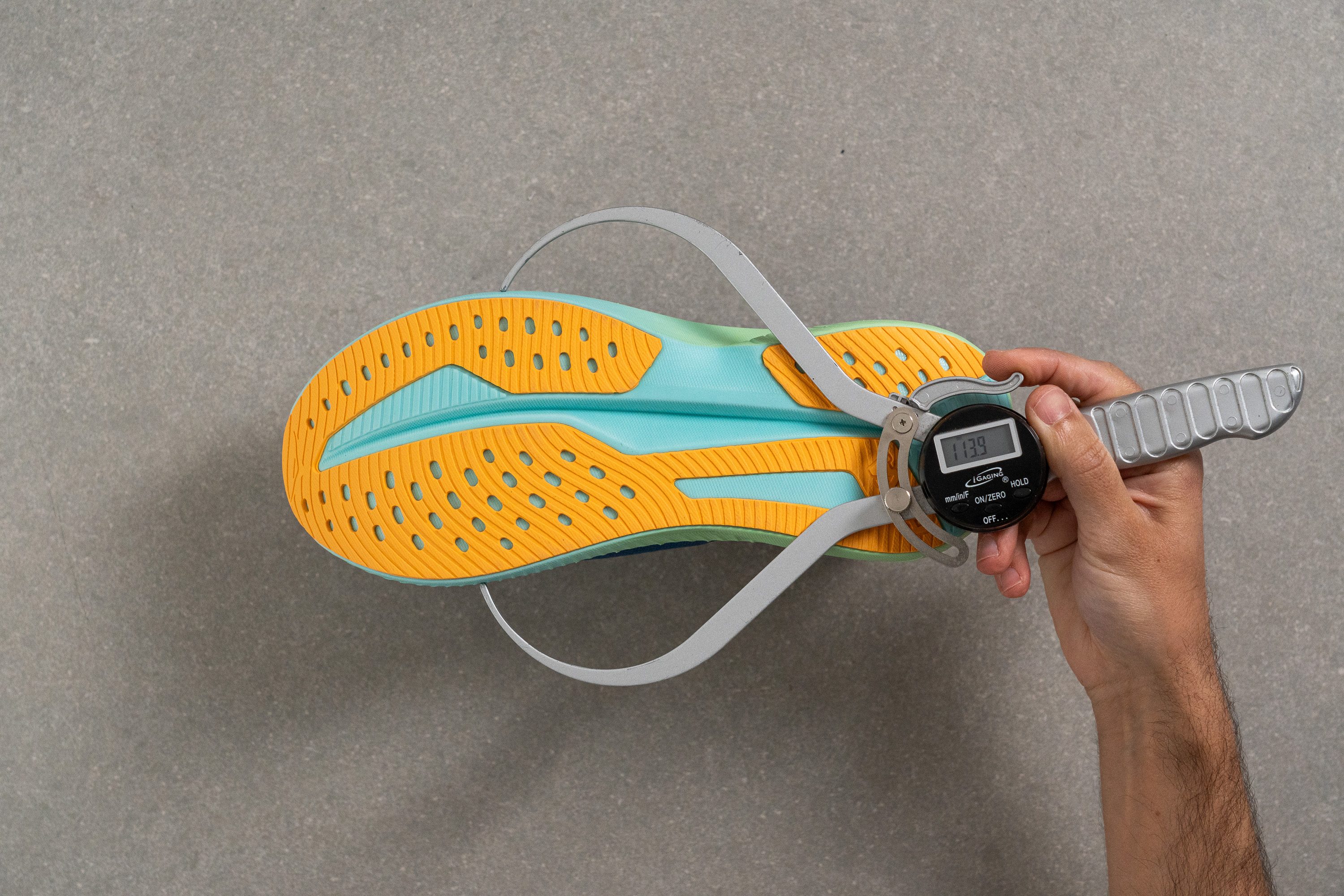
| Mach 6 | 113.9 mm |
| Average | 113.9 mm |
Midsole width in the heel
The heel measured 93.7 mm under our callipers, landing squarely in the realm of typical daily trainers. This average dimension is a key factor in why we don't recommend this shoe for those with significant stability needs.
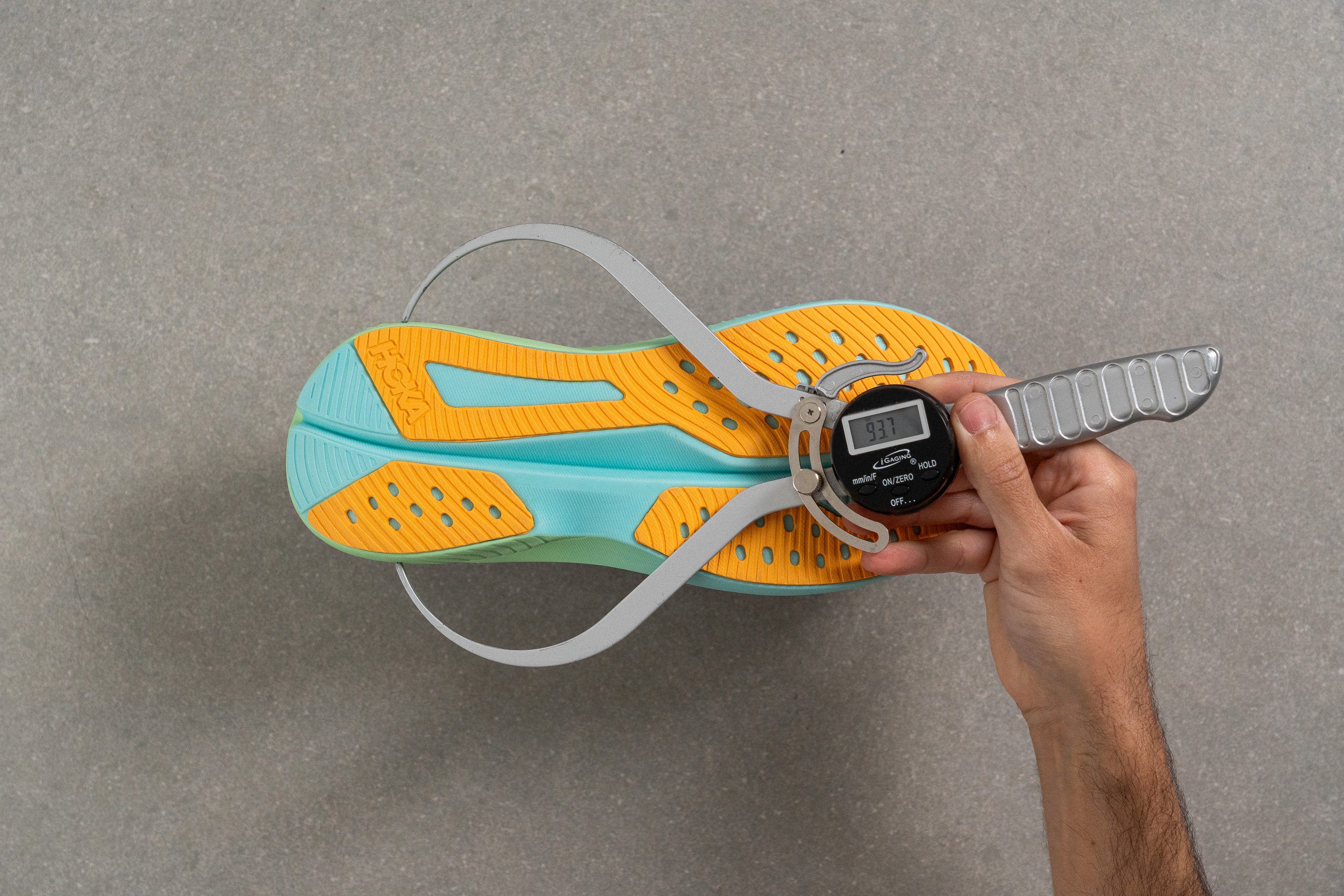
| Mach 6 | 93.7 mm |
| Average | 90.5 mm |
Flexibility
Stiffness
Although the shoe is quite rigid, the absence of a plate and the presence of outsole grooves maintain its flexibility lengthwise, at 18.7N in our signature 90-degree bend test. This flexibility is crucial for it to serve as a reliable and versatile workhorse capable of handling many miles comfortably.
| Mach 6 | 18.7N |
| Average | 28.8N |
Difference in stiffness in cold
We put the shoe for another 20 minutes in the freezer and it was only 22.8% stiffer when repeating our 90-degree test, which is indeed a surprisingly good outcome for an EVA-based foam.
| Mach 6 | 22.8% |
| Average | 34.9% |
Size and fit
Toebox width at the widest part
The toebox, as with most Hoka models, remains a topic of discussion due to the brand's traditionally narrow fit, which often sparks controversy. In the Mach 6, we noted a slightly more accommodating width in the widest part of the toebox, now measuring 98.4 mm.
However, a drawback is the limited vertical space. Those who often find issue with constrictive uppers might consider a different option like the Nike Pegasus 40.
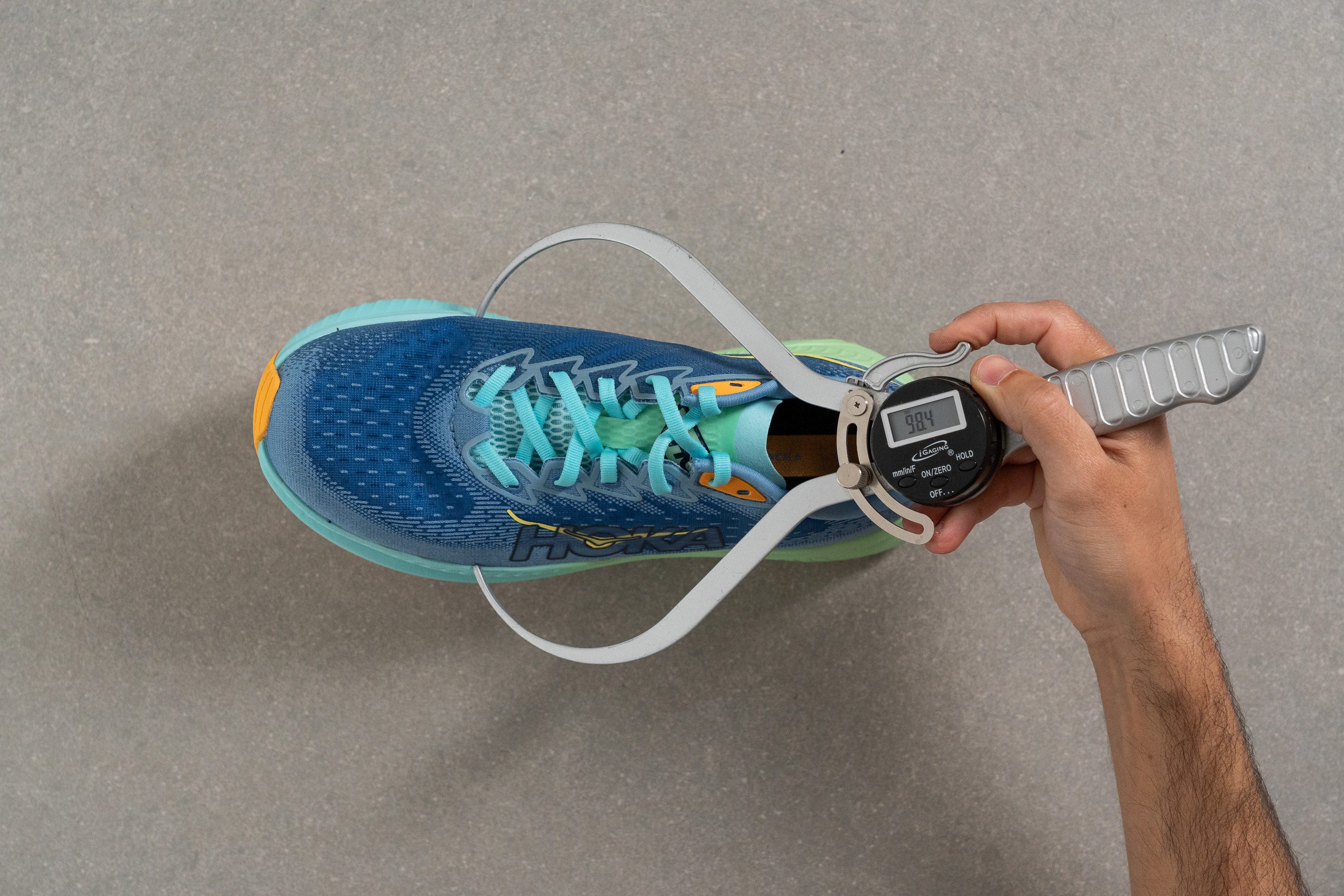
| Mach 6 | 98.4 mm |
| Average | 98.4 mm |
Toebox width at the big toe
The toebox narrows significantly around the big toe area, and this constriction is quite noticeable as it combines with a narrow midfoot to create a snug upper.
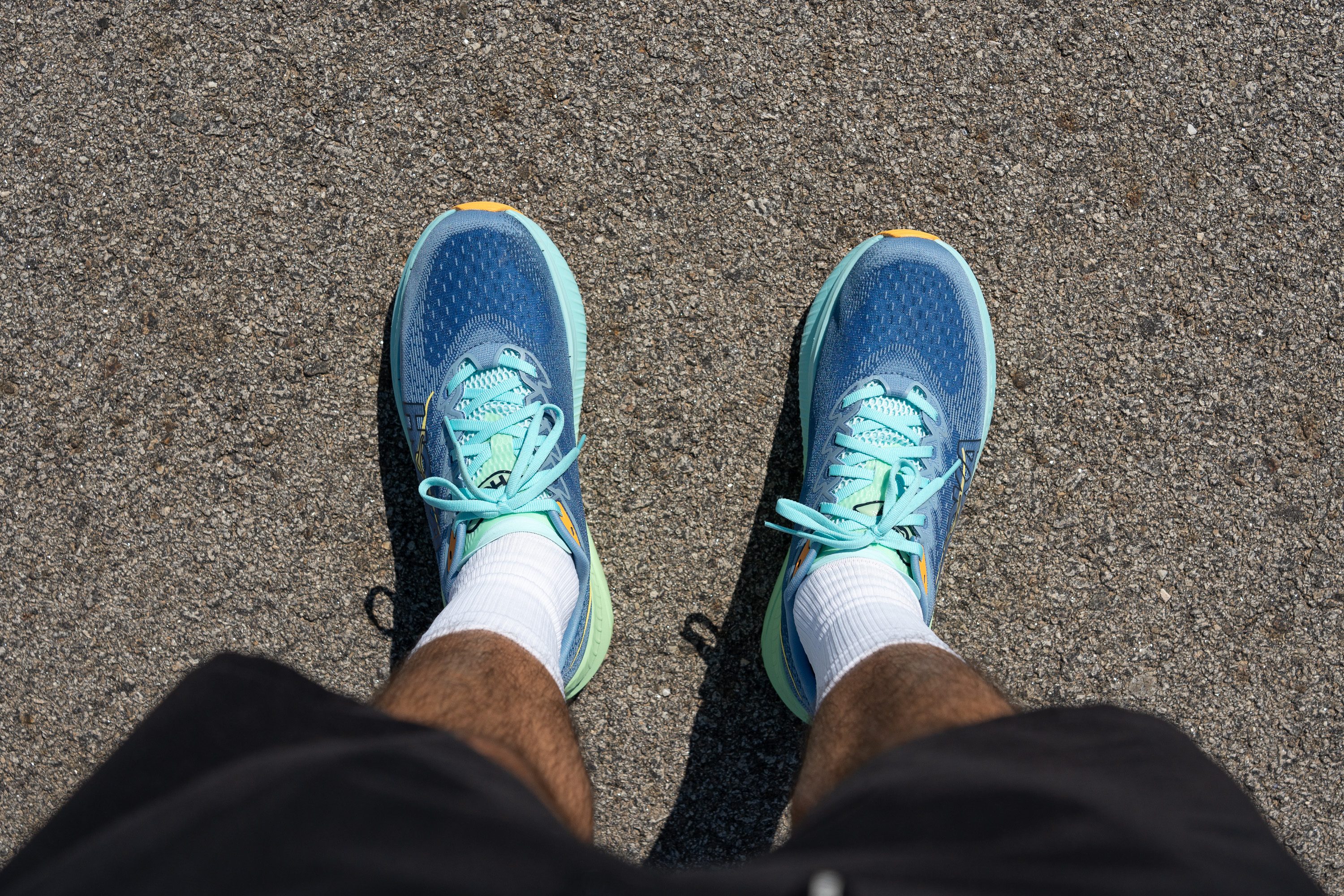
On the flip side, those who prefer a glove-like, tight fit and don't have wide feet will find this design appealing.
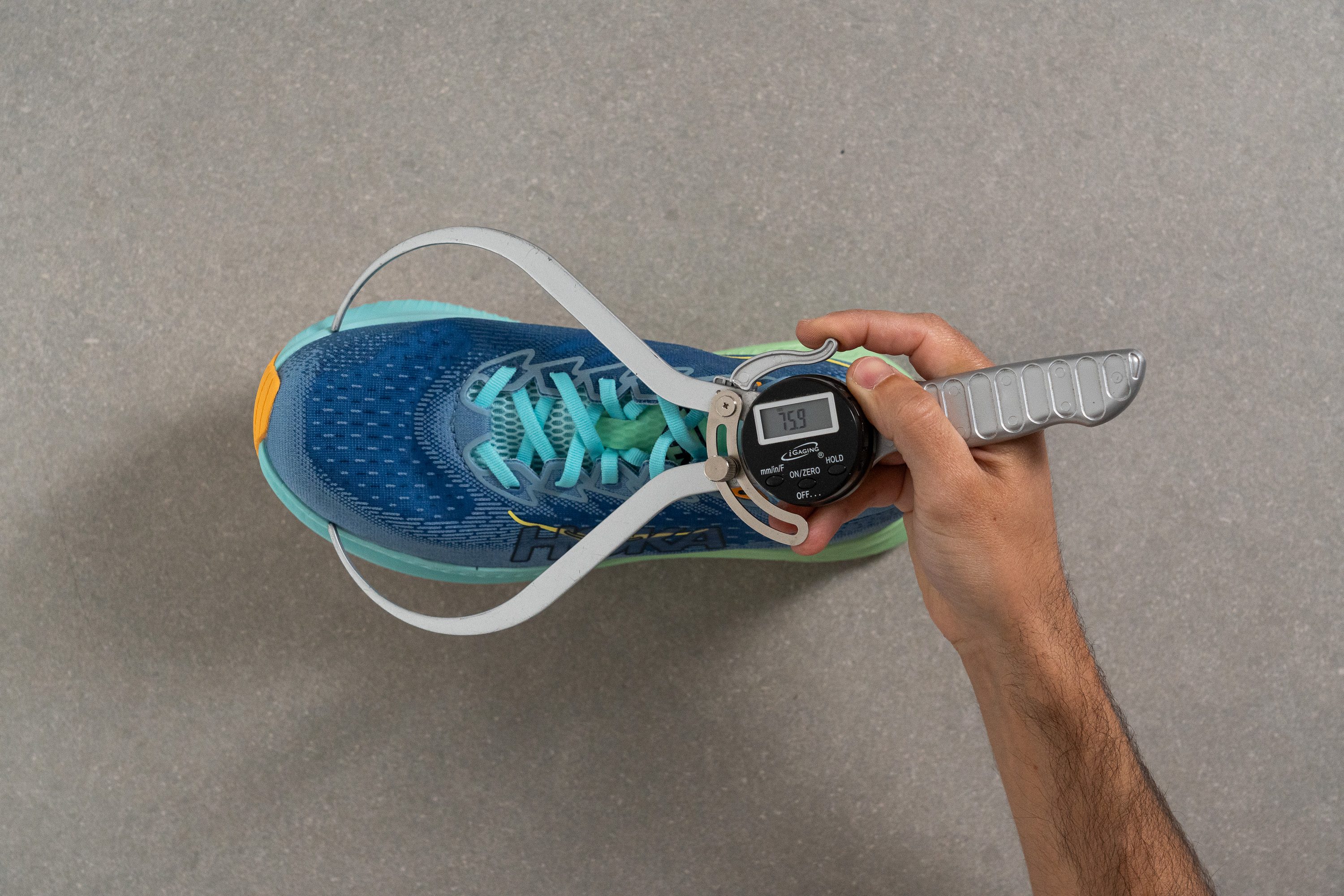
| Mach 6 | 75.9 mm |
| Average | 78.3 mm |
Tongue: gusset type
We discovered that the tongue is semi-gusseted, featuring a superb, breathable elastic strap on both sides. This design provides excellent lockdown at every pace, while remaining completely non-oppressive.
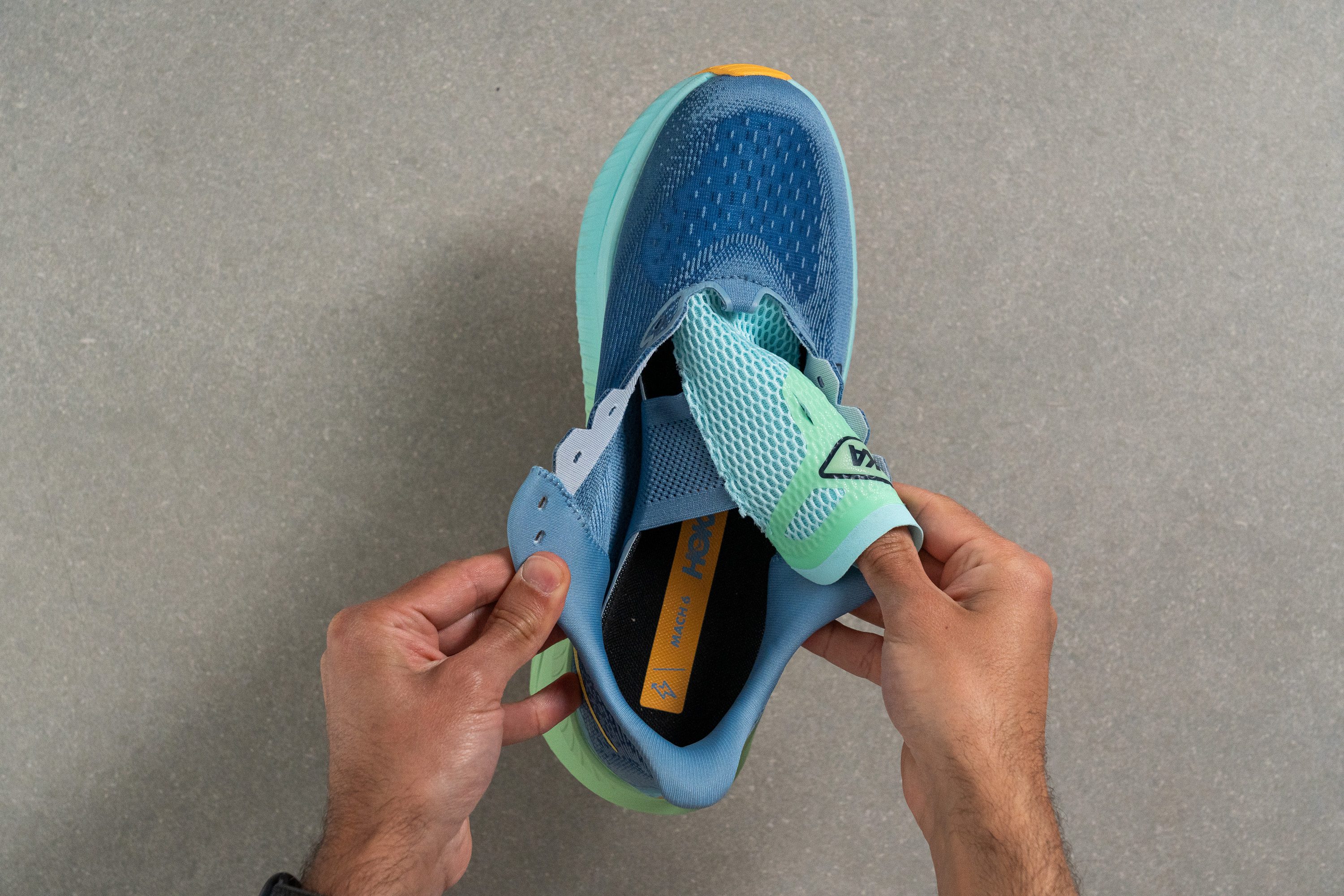
| Mach 6 | Both sides (semi) |
Comfort
Tongue padding
The tongue is exceptionally thin, featuring just 1.5mm of padding.
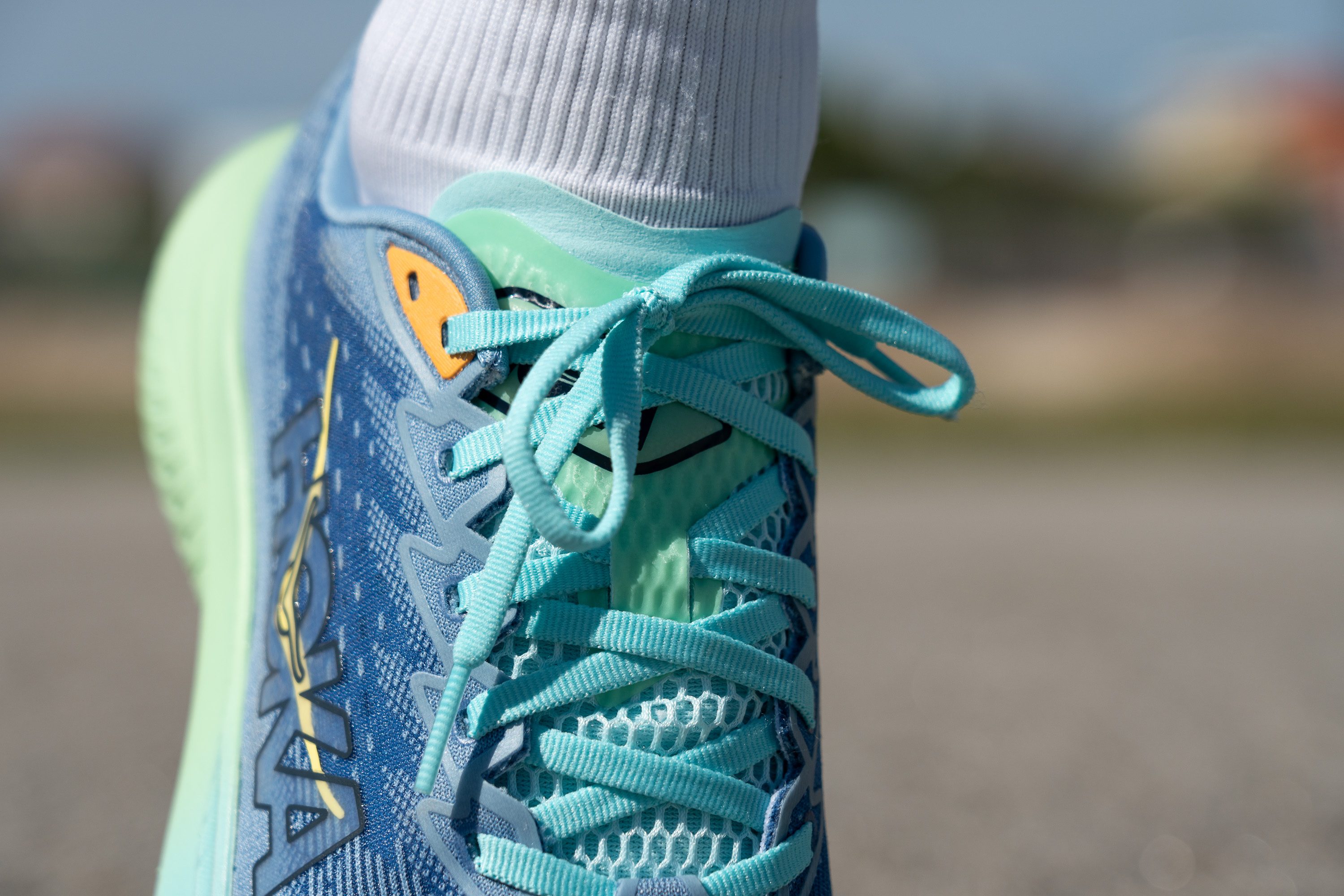
For those seeking additional comfort in the instep while still enjoying a similar Hokaesque ride, we recommend exploring the plush tongue of the Clifton 9.
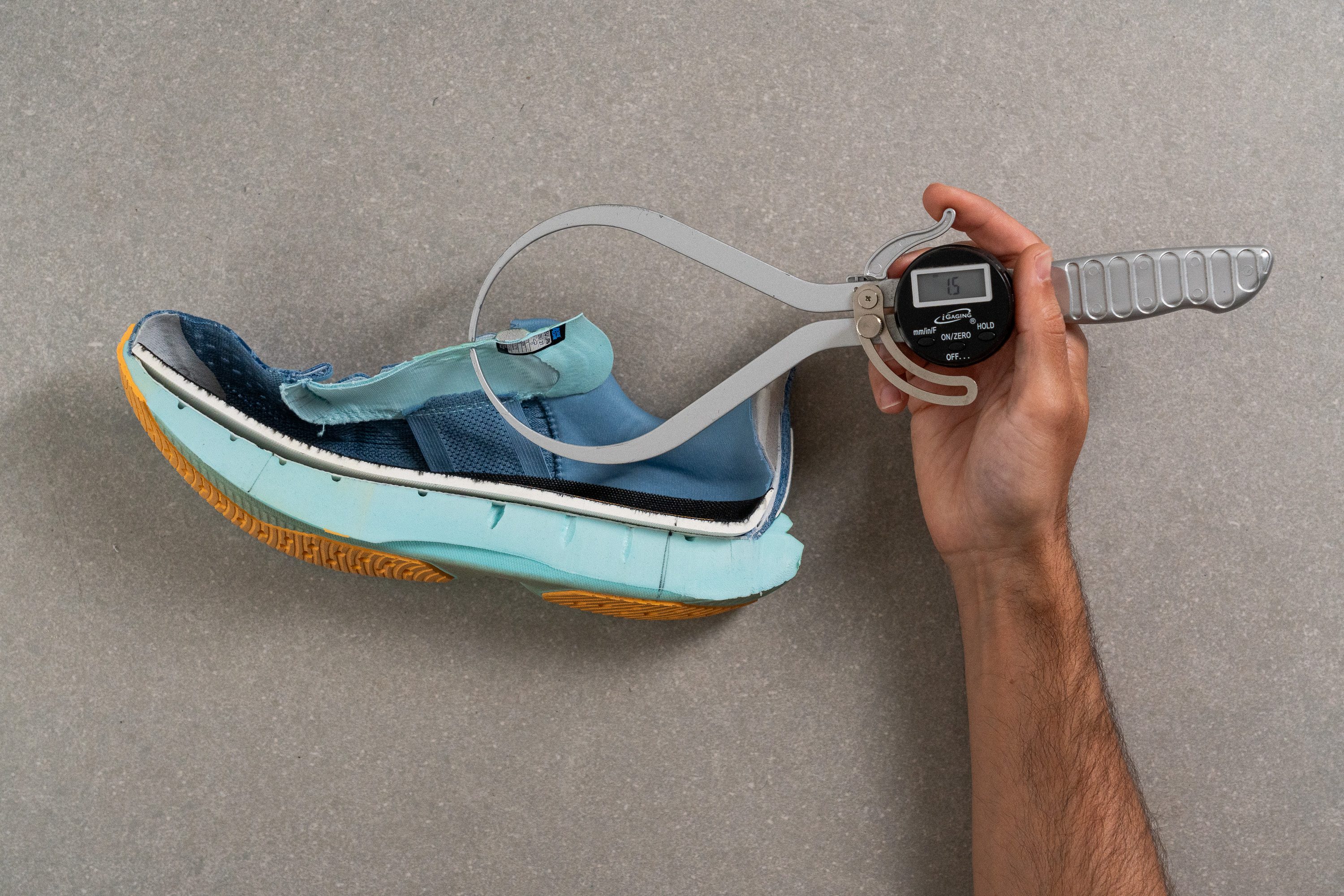
| Mach 6 | 1.5 mm |
| Average | 5.7 mm |
Heel tab
There's no finger-loop heel tab as seen in other daily trainers, but Hoka has incorporated their signature swallowtail-like heel collar. We've observed that it's included to alleviate pressure from the Achilles tendon.
| Mach 6 | Extended heel collar |
Removable insole
The insole is removable and can be replaced since it isn't glued to the last. However, it includes ventilation channels, so you might want to keep it during summer for its excellent ventilation.
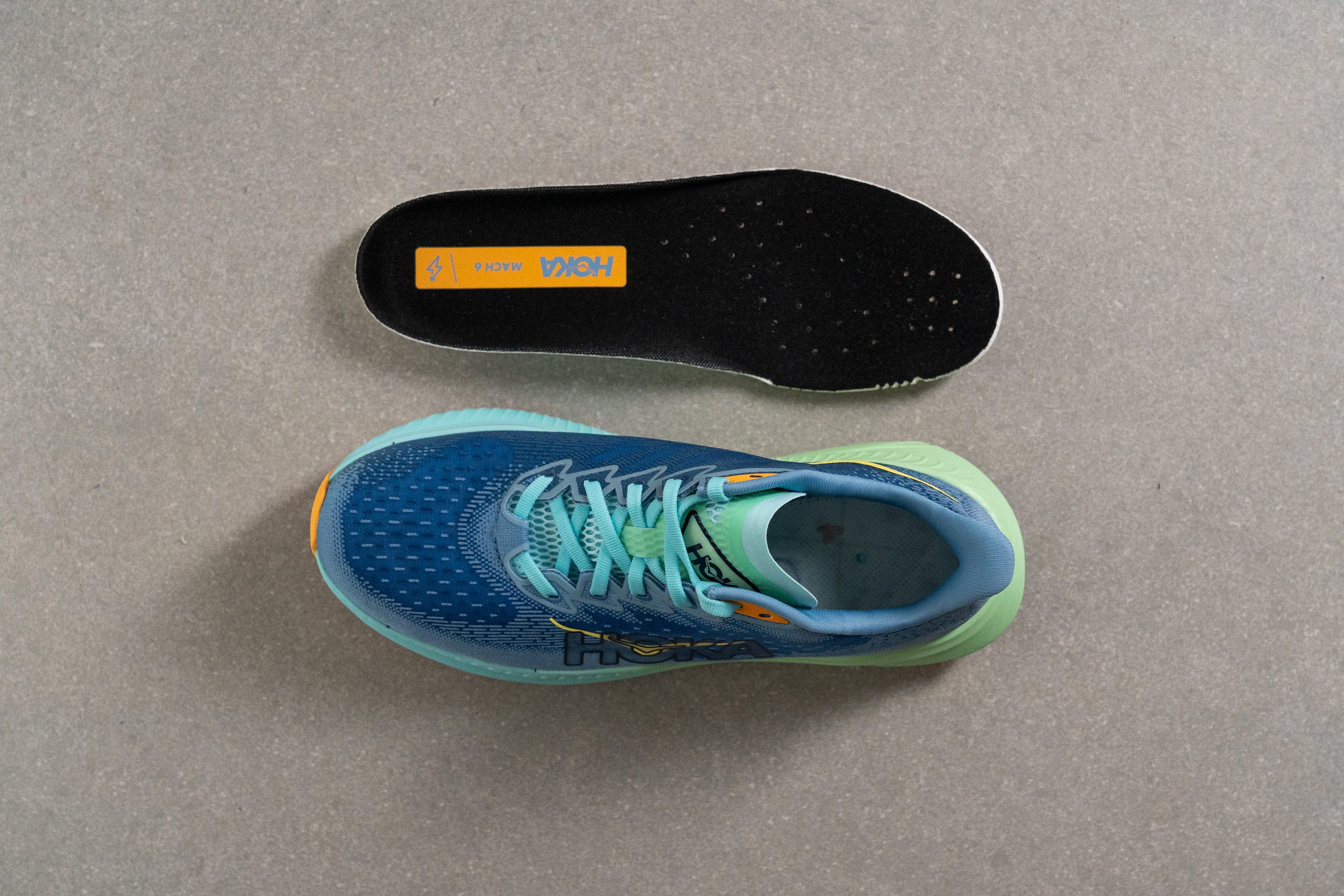
| Mach 6 | Yes |
Misc
Reflective elements
Hoka decided against including reflective elements in the Mach 6, which is disappointing. However, we think that the absence of hi-vis stuff can be overlooked this time, considering the reasonable price point.
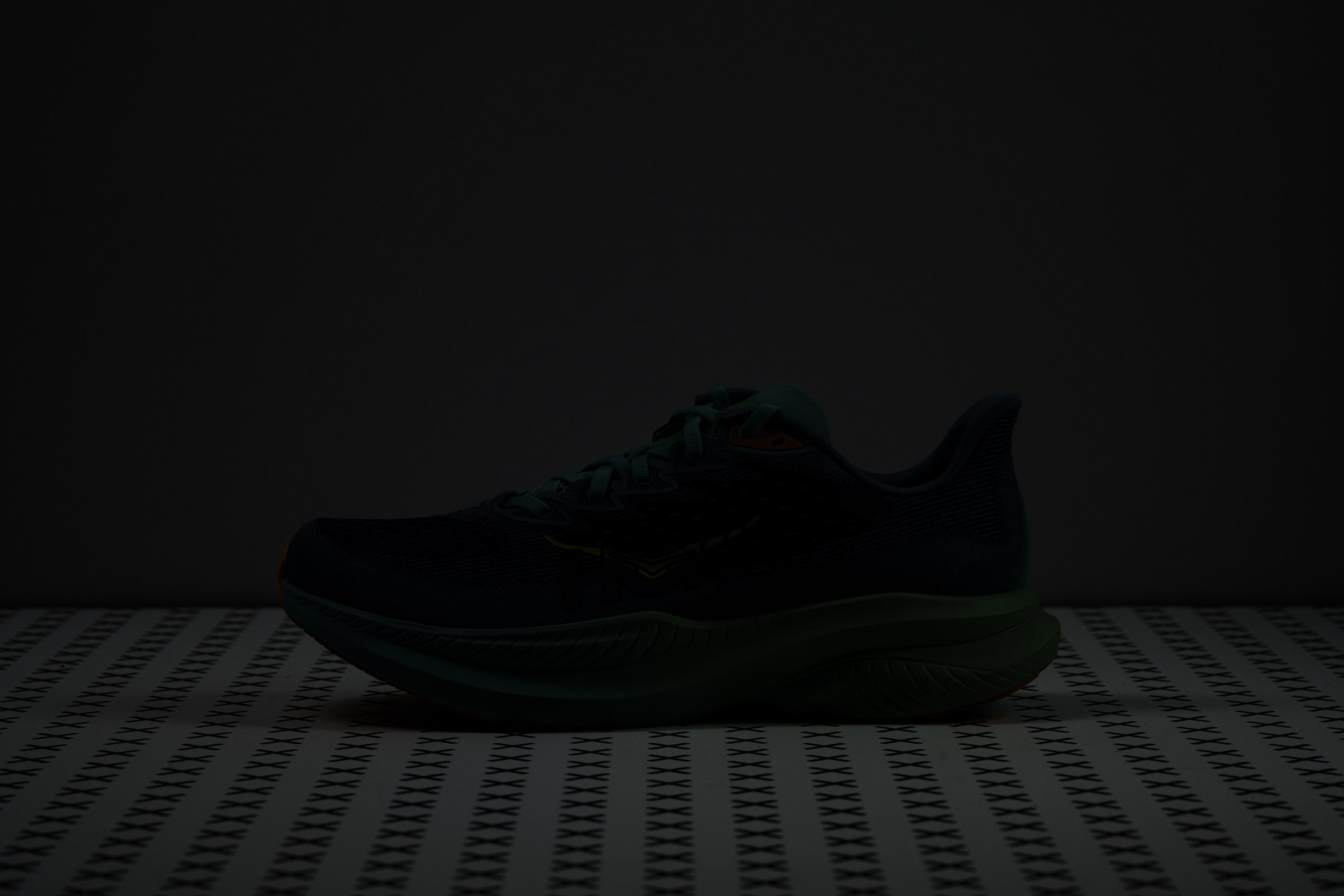
| Mach 6 | No |

